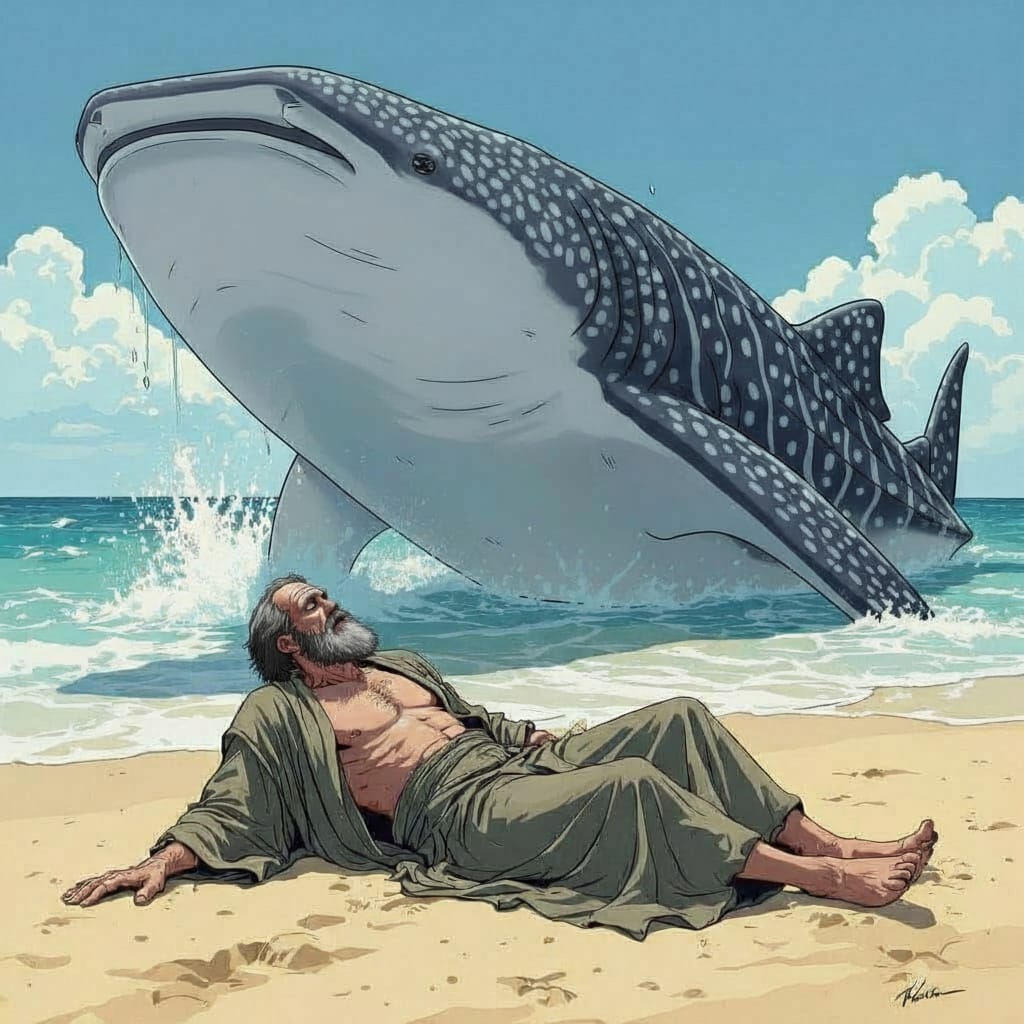Old Testament Servants
In the Old Testament, God performed miracles through the leaders and prophets He chose. No other nations or people groups followed the God of the Tanakh (Old Testament) in that time period, which spanned from approximately 4,000 BC at Creation, to 400 BC when the last book of the Old Testament was written. God’s people were called “Hebrews,” then “Israelites,” then “Jews,” based on names of certain leaders. They were considered servants of God, not children of God, since Jesus didn’t come to earth and die for the sins of all people until around 4 BC to 30 AD.
Adam & Eve
From the beginning of our physical universe, God has been actively involved with His Creation, the masterpiece being mankind. We are not a random accident formed by chance over millions of years. There is no evidence of evolution of species in any way, shape, or form. The Genesis account in the Holy Bible is the only plausible description of how this marvelous universe, and everything in it, was created. God has always been a God of miracles, and He doesn’t need a lot of time to do them. Most of His healing and creative miracles happened instantly, and it was no different when He created the universe. God made one part of Creation instantly each day, for six days, by speaking it into existence. We know these were 24-hour days because with each aspect created, the Bible says there was only one evening and morning involved on the first day through the sixth day. On day one, God created a giant sphere of water energized with His presence, resulting in the Earth’s magnetic field. He also spoke light into existence. Science has discovered that sound waves directed at water will produce light (video references below).* On day two, God created a firmament dividing Earth’s atmosphere from outer space. This firmament likely served as a

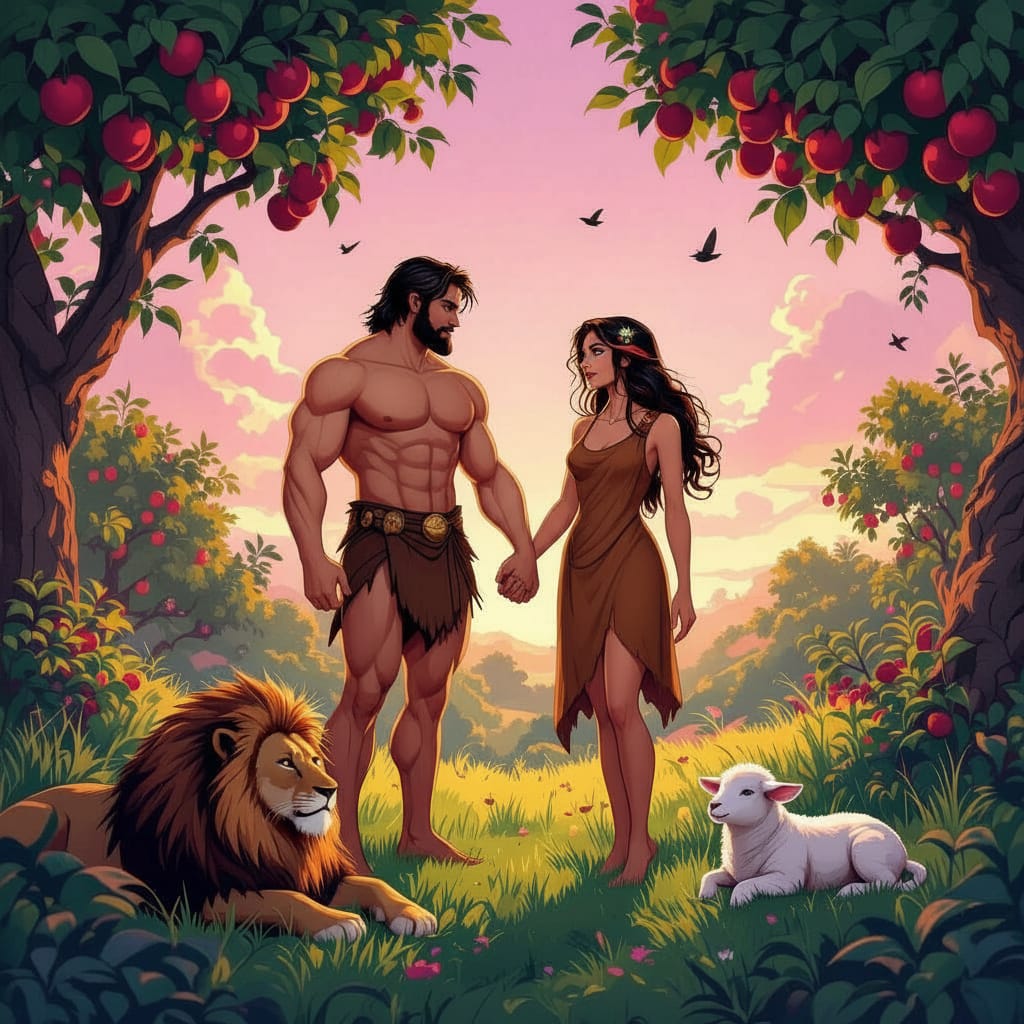
protective bubble around the Earth. Studies indicate it may have been composed of crystalized hydrogen, which could block harmful ultraviolet radiation, charge the Earth’s magnetic field (along with the Earth’s magnetic core), and make the sky look pink, like just before sunrise, which has been proven to be the best light for plant growth.* On day three, God spoke dry land into existence, along with all plant life. In Genesis 7:11, we see the initiation of the world-wide flood, where an underground reservoir burst through the Earth’s surface, cracking it with fault lines and popping the protective bubble. From around 100-300 years later, the Earth further melted down, enlarging and causing continental drift to occur (Genesis 10:25). This would reduce gravity and atmospheric pressure. The original, slightly smaller, denser planet Earth with higher gravity and atmospheric pressure would help explain why everything found in the fossil record is much bigger than their counterparts living today.* Adam may have been around eight feet tall. On day four, God spoke the sun, moon, stars, and galaxies into existence. Some scientists believe space is billions of years old, but its aged appearance can be accounted for by God having stretched out the
heavens/fabric of space (Isaiah 40:22; 42:5; Job 9:8; Jeremiah 10:12). On day five, God created all sea creatures and fowl, fully formed (the chicken came first), and producing after their own kind. This eliminates the idea of evolution. On day six, God made the remaining land animals (including dinosaurs, two of which which are describedin one of the oldest books of the Bible, Job 40 and 41). All animals, and man, ate only plants, so there were no predators in this high-nutrient environment. No volcanoes, storms or rain, either. Just a mist from the ground (Genesis 2:5, 6). God finished His work by creating mankind, male and female, in His own image (Genesis 1).
God took His time creating man. He formed Adam from the dirt and breathed life into him. God interacted with Adam and Eve directly. In John 1:1-3, 14, Colossians 1:12-16, and Hebrews 1:2, Jesus is identified as the Creator of the universe, so He likely appeared to them in a pre-incarnate body for these visits. He planted what was surely the world’s most amazing garden in Eden, including the Tree of Life. He told Adam he could eat from every tree in the garden except the Tree of the Knowledge of Good and Evil. If he ate from that tree, he would die. Romans 6:23a KJV states “For the wages of

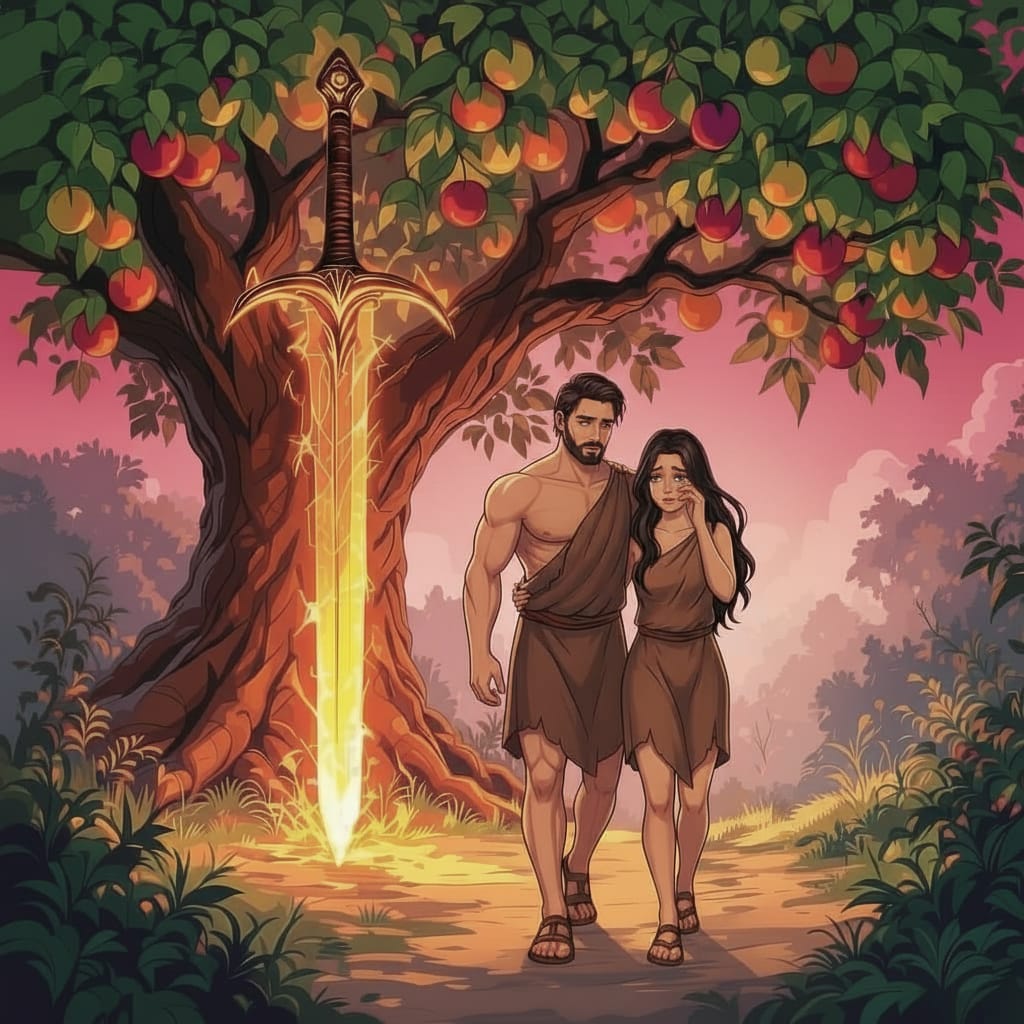
sin is death….” This also implies that there was no death before sin occurred, so, millions of years of evolution involving trillions of death cycles in evolving life forms didn’t happen. God allowed Adam to name all the animals as He brought them to him. This implies that Adam was a genius due to having a bigger, fully-formed brain due to the added atmospheric pressure which allowed blood to be pumped into the deep cell tissue.* Today, many people might come up with animal names such as “Thing One,” “Thing Two,” and “Thing Three.” Rarely, we still see this kind of genius demonstrated among savants. This is due to the right side of their brain being fully formed, when the other side doesn’t develop properly. The down side is that they function on the social level ofyoung children their whole lives. But even with a super brain, andall the animals, Adam was still alone. God put him into a deep sleep, removed one of his ribs and made a woman from it. When God presented her to Adam, I’m sure it blew his super mind (Genesis 2).
Adam named the woman Eve because she is the mother of all living. This indicates all humans originally came from Adam and Eve. This also implies there is no life on any other planet in the physical
universe. However, there is other life in the spirit world. Satan, now fallen from Heaven (Isaiah 14:12-15; Ezekiel 28:12-19), as witnessed by Jesus long before coming to Earth (Luke 10:18), took the form of a serpent and twisted God’s words to tempt Eve to eat from the forbidden tree. Not only did she fall for it, Adam was there and also ate from the tree. As God had warned, they died that day—iritually, not physically. They were separated from God and all living things began to die physically. Adam and Eve hid from God when He came again to the garden. When they admitted their disobedience, God prophesied that there would be a descendant of Adam and Eve who would bruise the head of Satan. God also gave consequences for humans that made life much harder for them, including laboring to grow crops, and experiencing pain in childbirth.Adam and Eve were also kicked out of the Garden of Eden so as not to eat from the Tree of Life, which would have kept them separated from God forever (Genesis 3).
Even after starting the death process by sinning, Adam lived 930 years in the pre-flood environment (Genesis 5:5). Yet despite God giving mankind everything they could have ever wanted, they still turned away from Him and toward sin, resulting in the world-wide disaster known as Noah’s Flood, which is further detailed in the next lesson.
*For an in-depth study of the Earth’s original environment, dinosaurs living with humans, and scientific evidence of the Biblical account of Creation, including artifacts and fossil evidence, click the videos by Dr. Carl Baugh of the Creation Evidence Museum of Texas.
Noah
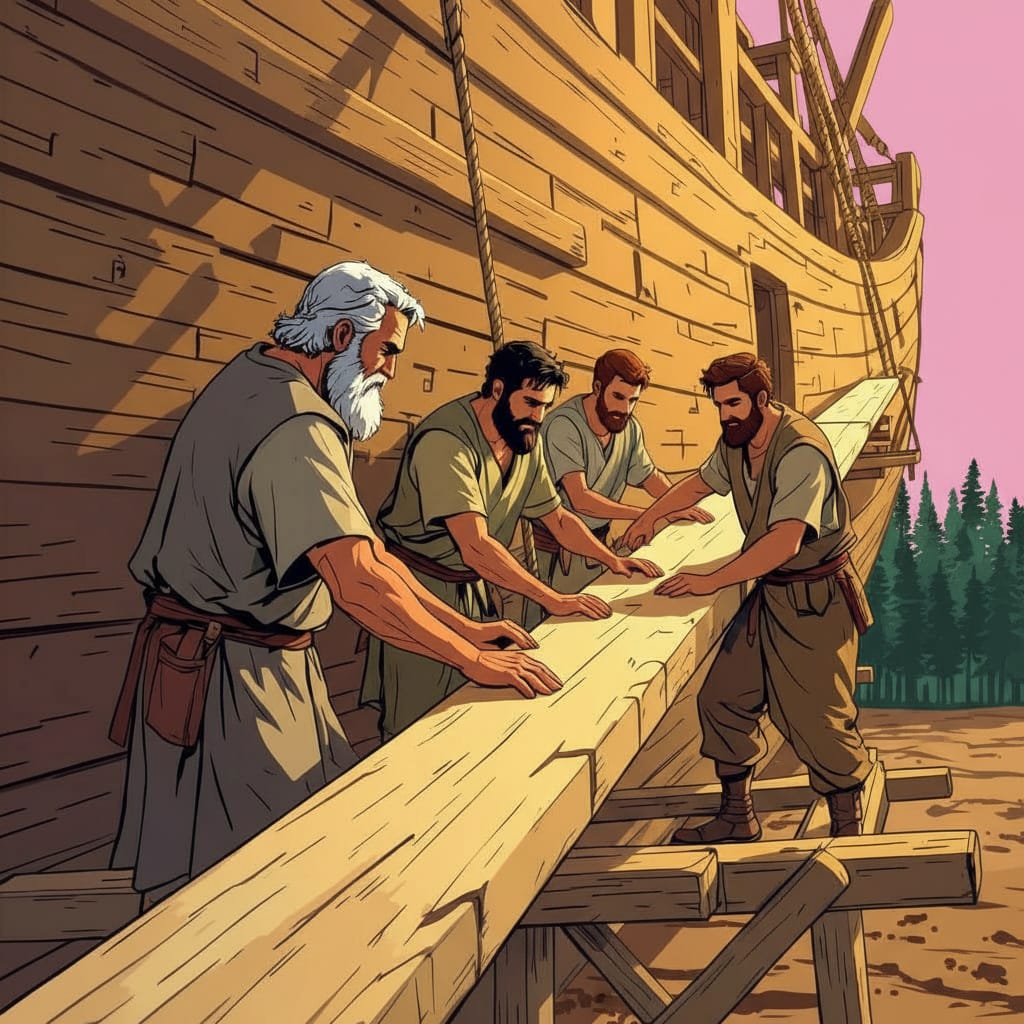
When everyone else on earth was thinking and doing evil continually, Noah found grace in the eyes of the Lord. He was a just man and walked with God. Because of this, God supernaturally spoke to Noah to save him, and his family, from a coming world-wide flood. God gave him specific instructions on how to build a giant ark, which was approximately 450 feet long, 75 feet wide and 45 feet high, with three levels. That was plenty of room to fit all the animals on board, including dinosaurs. They would have taken young animals, which were much smaller, and would best replenish the planet. They also needed just one type of each animal. So, for example, just two dogs, not two of each of the 339 breeds of dogs we have today. And to make the task much easier, God supernaturally brought male and female of every kind of animal onto the ark, without Noah having to go catch them. It included seven sets of clean animals and one set of unclean animals, plus seven male and female sets of all kinds of fowl. Instead of flying away, they flew to him. Also included was every type of creeping thing, such as reptiles, amphibians and insects. And no worries about whether they are male or female. God handled that, too. Based on Noah’s age when his first son was born,
which was 500 years old, being given the task when his three sons were already married, and his age when the flood began, 600 years old, it is estimated to have taken 50-75 years to build the ark. Even though people lived way longer before the flood, that’s still a monumental feat. These four men had to fell hundreds of huge trees over the length of about two football fields just to have space to build–without having even one chain saw. Then they had to cut the logs into planks and beams and connect them in a way that the ark wouldn’t break apart, or even leak, for a period of about a year, which kicked off with the biggest storm in the history of the world. Noah obeyed all God’s instructions and completed the ark seven days before the flood came, and God Himself shut the door of the ark and sealed them in. The rain storm lasted 40 days and nights, and would have included tsunamis due to the fountains of the deep blasting through the Earth’s crust on ocean floors, as well as on land. This is how massive dinosaurs could be swept away and covered in sediment very quickly, along with the moon’s gravitational pull, leaving fossils flattened and spread-out. The flood waters rose for 150 days, then lowered for 150 days. Noah then released a raven
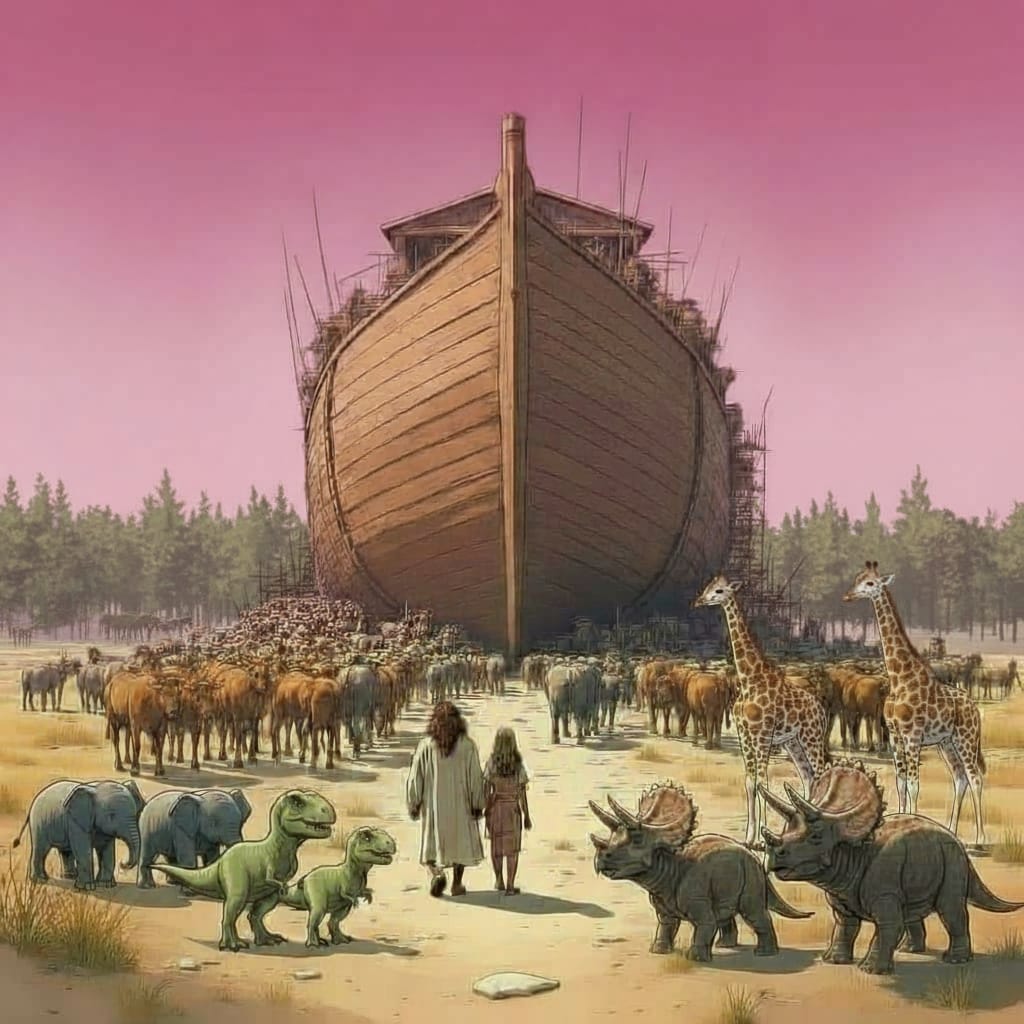
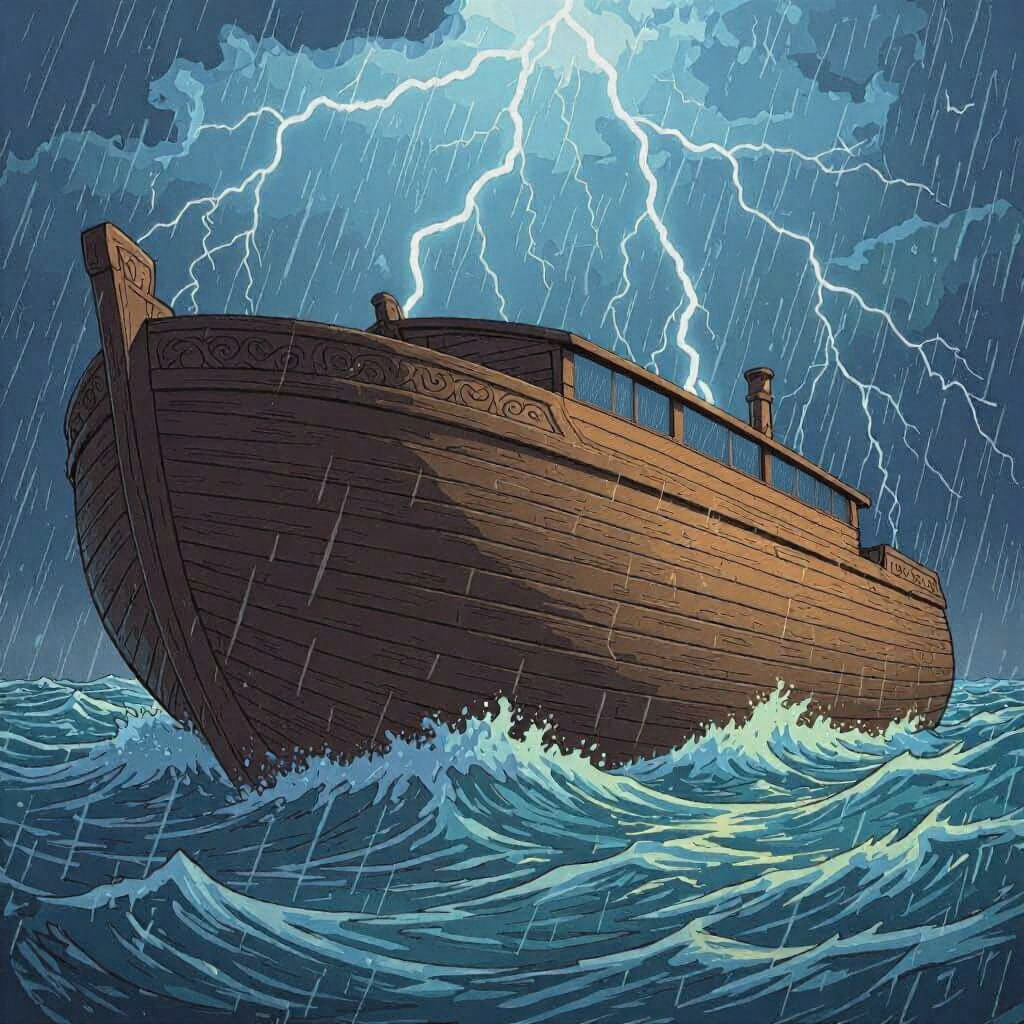
and a dove to check for dry ground. The dove returned twice, but didn’t return after its third release, so Noah knew the land was ready to live on again. God told Noah to take his family and all the animals off the ark to begin replenishing the earth (Genesis 5:32-9:1).
So, why did the flood happen? The Earth is like a giant nuclear reactor. Centuries of mankind sinning continually created a disturbance in the planet, including the top, moderating layers of the Earth. This heated the waters under the Earth’s crust, increasing the pressure until it cracked, much like a nuclear meltdown in physical power plants. We can’t blame God for the consequences of our rebellion. But despite the whole world turning away from Him, God intervened in the life of the only man who served Him at that time, resulting in the human race and every kind of land animal getting a second chance. Followers of God being saved on an ark, while the wicked were left to face the judgement of God for their sins, is a clear sign of how Jesus came to Earth and saves His followers from sin and judgement. Don’t miss the boat!
Geological evidence of Noah’s flood is discussed in detail in the aforementioned Creation videos. The sedimentary rock layers spanning across every continent were all deposited quickly during the world-wide flood, which is the only event that could have produced trillions of fossils all over the planet.
Abraham
When Abram was 75 years old, God told him to start fresh in a land He would lead him to. God promised to bless him, his family and all families of the earth through him. He took his wife, Sarai, his nephew Lot, and some servants. God led them to a land called Canaan (Genesis 12:1-5).
There, Abram had a vison from God, telling him he would have a son and descendants as numerous as the stars (Genesis 15:4, 5). Many years later, when Abram was 99 years old and still had no child with Sarai, God appeared to him and made a covenant with him. God renamed him Abraham, which means father of many nations. God also changed Abraham’s wife’s name to Sarah, which means mother of nations. She was 90 years old at this time, and had no children of her own (Genesis 17:1-21). When Abraham was 100 years old and Sarah was 91, they had the promised child, as God foretold (Genesis 21:1-7).
God later tested Abraham’s faith and dedication to Him by telling Abraham to sacrifice his promised son. Abraham didn’t hesitate to obey. He arose early in the morning packed the wood for the burnt offering, and took his son, Isaac, up on the designated mountain,
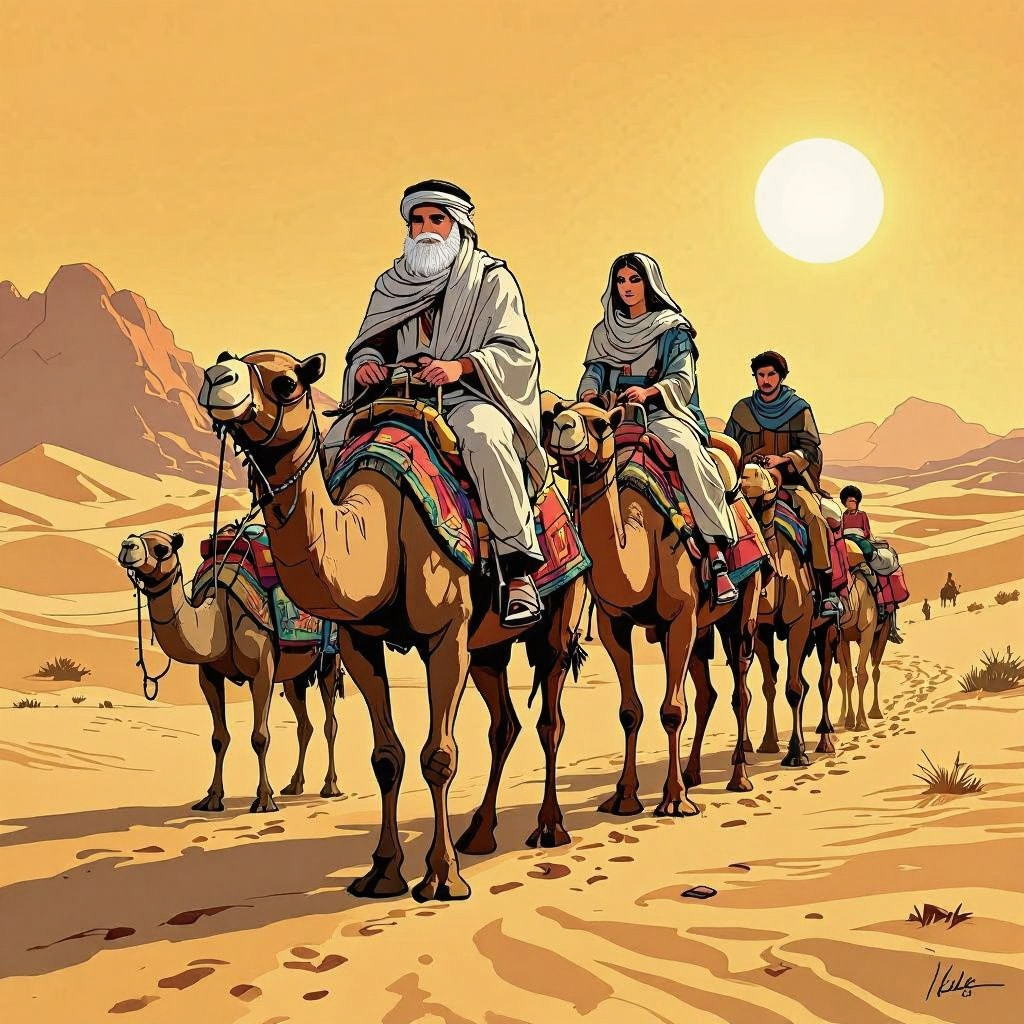
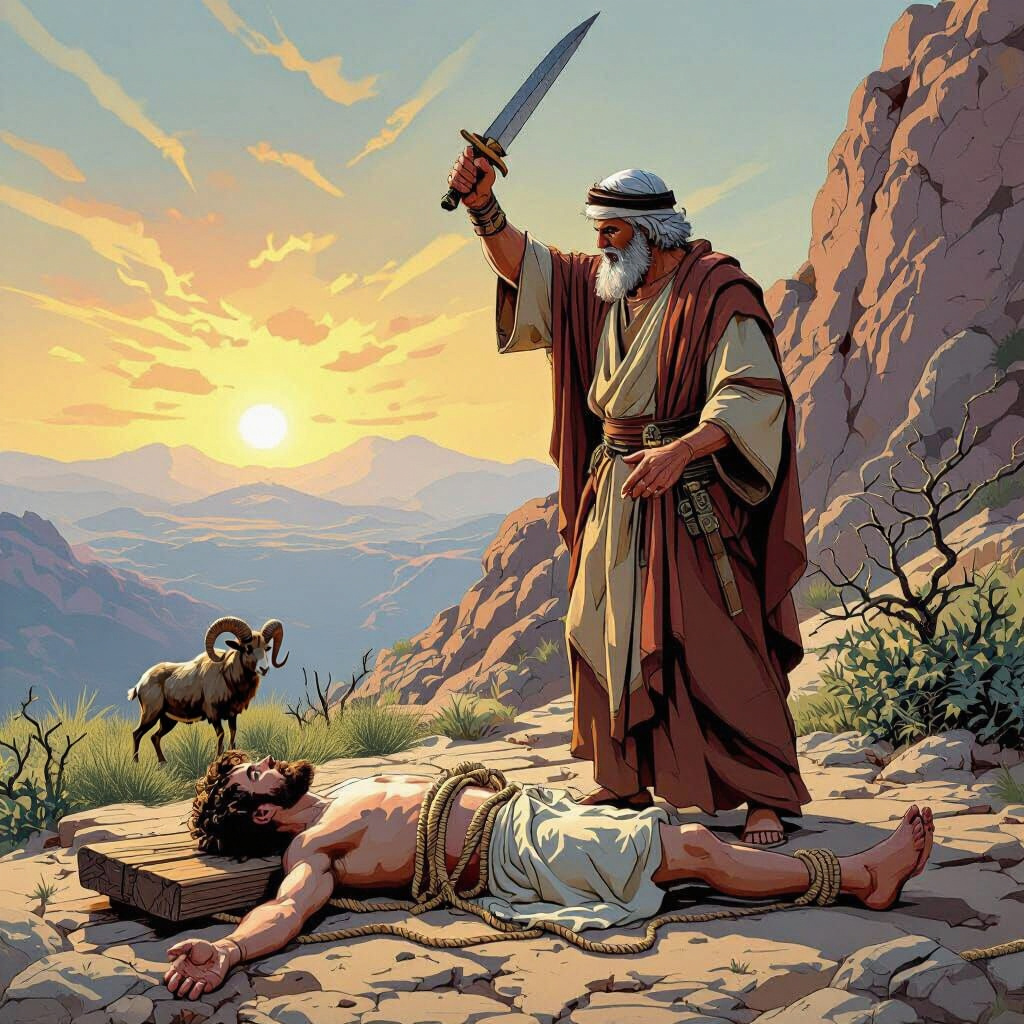
believing God would provide another sacrifice and spare his son, which is exactly what happened. Just before Abraham sacrificed his son Isaac on an alter, God called out from Heaven to stop him. God saw that Abraham was completely dedicated to Him and willing to give up his only son. So God provided a ram for the sacrifice, causing it to get its horns caught in a bush right behind Abraham. God spoke a confirmation of His promise of descendants as numerous as the stars of the heaven and the grains of sand on the sea shore, and their victory over all future enemies, and the blessing of all nations on the Earth because he obeyed His voice (Genesis 22:1-18).
Bible history has shown this promise coming true in every way. Both for the Hebrew/Jewish people, and for the Gentiles, which includes everyone else. Abraham being willing to sacrifice his only promised son is a direct cause and foreshadowing of God the Father sending His only Son to be the sacrifice for the sins of the world.
Joseph
Abraham’s great grandson, Joseph had a God-given ability to interpret dreams. His gift first occurred at age 17. His ten older half-brothers were already jealous of him because he was favored by their father, Jacob. When he told them his dream, they hated him more. He said in his dream, they each bound sheaves in the field and his brother’s sheaves all bowed to his sheaf. He also told them, and his father and younger brother, a second dream. In it the sun, moon and 11 stars bowed to him. Then, when the older brothers went to feed their father’s flock in a nearby town, and Joseph was sent by their father to check on them, they conspired to kill him as he approached from afar off. Reuben convinced them to throw him into a dry well instead. As they ate, a group of merchant traders passed by headed for Egypt to sell their goods. Judah suggested they sell Joseph to them to avoid killing him, and everyone agreed, due to Reuben’s absence. They tricked their father into thinking Joseph had been killed by a wild animal by presenting his cloak dipped in goat blood (Genesis 37).
Joseph was sold into slavery in Egypt to a high-ranking officer of the Pharaoh, the captain of the guard, named Potiphar. In (continued)
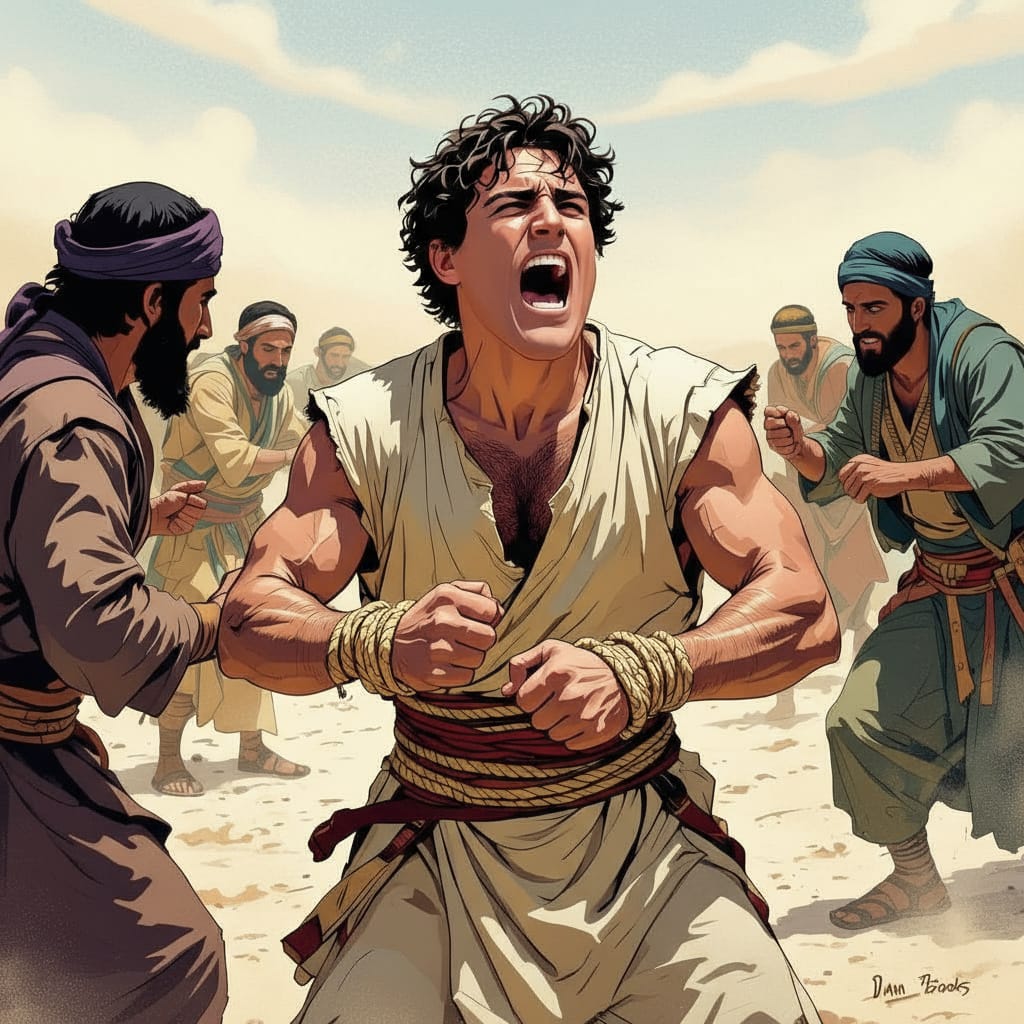
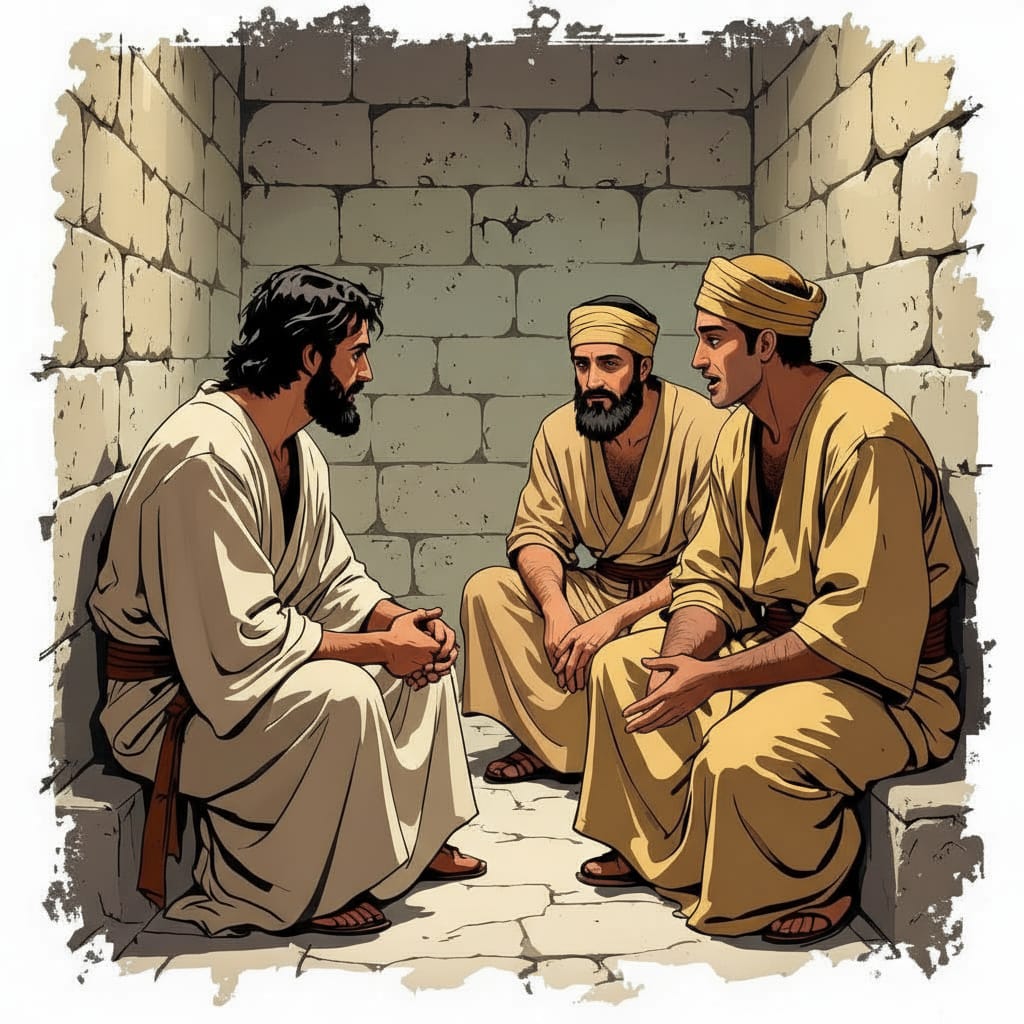
Pharaoh’s house, God made everything Joseph did to prosper, and he was made the overseer of all that Potiphar had. Then Potiphar’s wife tried to seduce Joseph and he refused her. She then accused him of assault and Potiphar threw him in Pharaoh’s prison. In prison, Joseph continued to prosper and was put in charge of all the prisoners and daily operations (Genesis 39).
During this time, the Pharaoh’s cheif baker and butler were also thrown into the prison and Joseph watched over them. They each had a dream and Joseph interpreted them. In three days, the chief butler would be restored to his position serving Pharaoh, and the chief baker would be hanged by Pharaoh (Genesis 40).
Two years later, Pharaoh had two troubling dreams. He called for his magicians, but none was able to interpret the dreams. But the chief butler remembered how Joseph had interpreted his dream, and that of the chief baker. He told the Pharaoh, who hastily ordered Joseph out of the dungeon to stand before him. Pharaoh described the two dreams and Joseph interpreted them to mean the same thing—seven years of plenteous harvest followed by seven years of famine. Joseph showed wisdom and proposed a plan to store grain (cont.)
during the plenteous years to prevent disaster. Pharaoh saw that God was moving in Joseph and set him above everyone, short of his throne, as governor of Egypt. Joseph was 30 years old at the time. He was given riches and a wife, and had two sons. His interpretation proved to be correct as they enjoyed seven years of plenty while storing up for the coming famine. When the famine hit, the whole earth was affected. People came to Egypt from all countries to buy corn. Joseph decided all matters including the sale of grain, at Pharaoh’s request (Genesis 41).
Eventually, Joseph’s ten older brothers came to buy corn in Egypt. When they came before Joseph, they all bowed down before him, as did those from every country, just as Joseph’s first dreams had predicted. They didn’t recognize Joseph, who hid his identity and spoke through an interpreter. Joseph knew them, but wasn’t ready to forgive them. He put them through a series of tests, which ended with the ten brothers either handing over their youngest brother, Benjamin, to be his slave, or fighting to the death for his protection.
They chose to repent of what they had done to Joseph and refused to hand over Benjamin. It was only then that Joseph revealed himself to them and forgave them. He called for his whole family to move to Egypt with him (Genesis 42-45).
Joseph is an example of God’s miracle power orchestrating an amazing series of events which moved Joseph from his homeland, to Egyptian slavery, to prison, to the palace, honoring God with his high moral character and supernatural gifts in each position of life to ultimately save the world from famine and death. It’s another clear sign of what Jesus has done to save everyone from spiritual death.
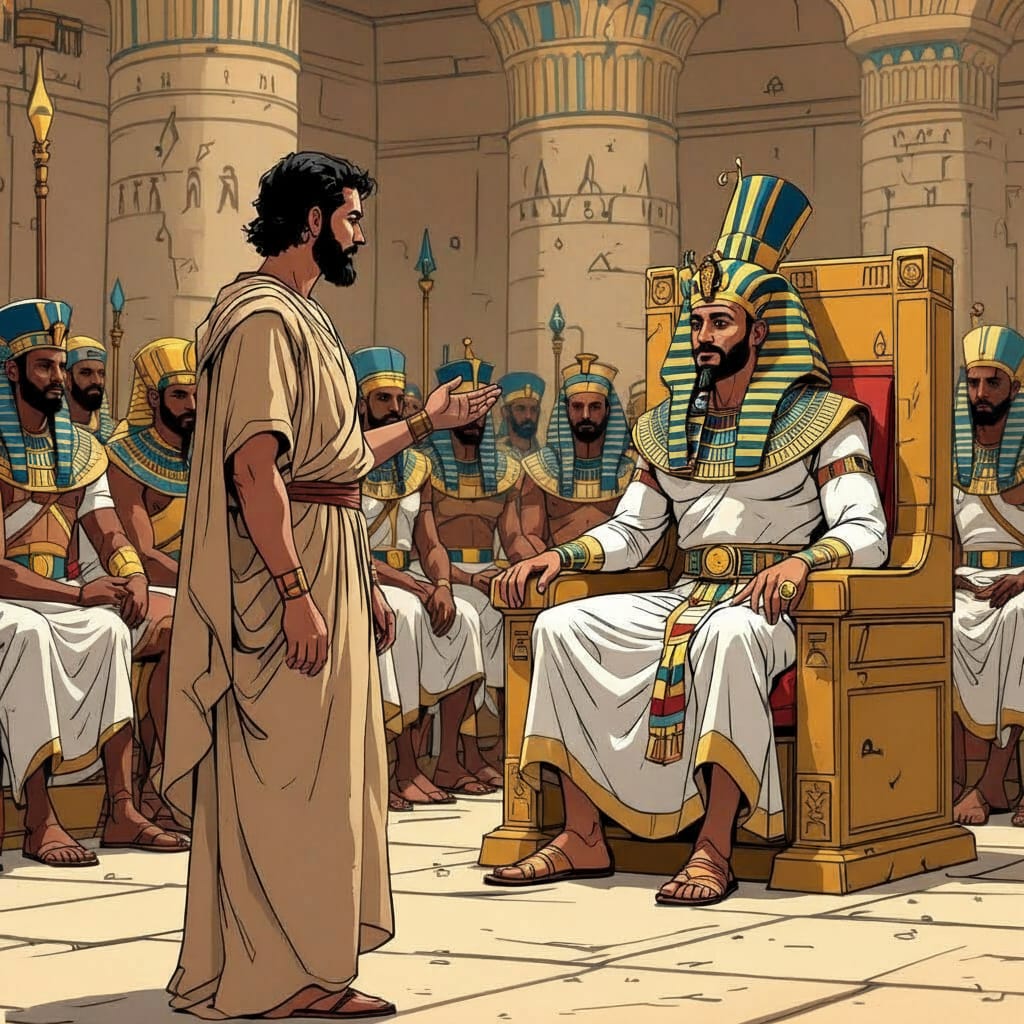
Moses
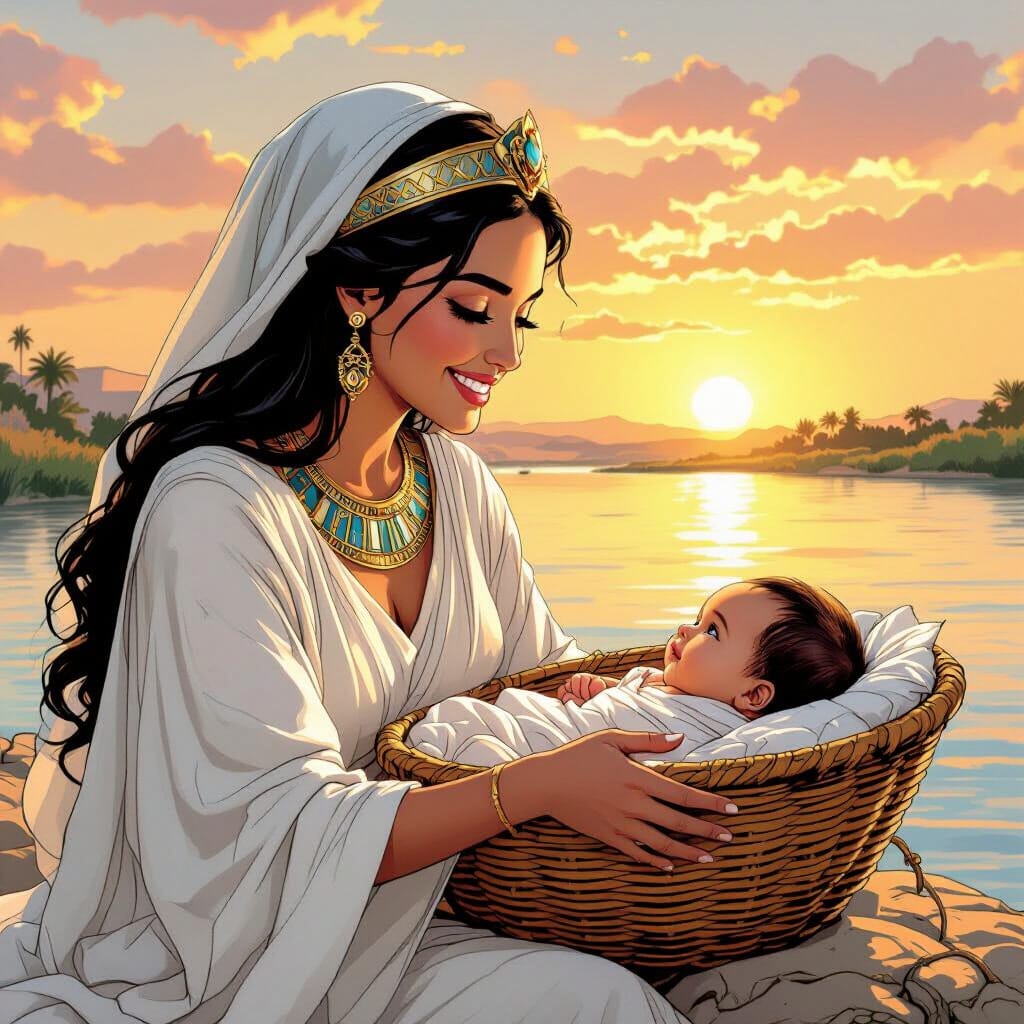
The children of Israel prospered in Egypt and greatly increased in number. But sometime after Joseph died, a new Pharaoh became king who didn’t know Joseph and the blessing he provided Egypt. He feared the Hebrews might take over the country, so he made them slaves and ordered the newborn male children of Israel to be killed to slow their growth (Exodus 1).
One Hebrew mother hid her newborn baby. After three months she placed him in a basket and floated him down the Nile river. Her daughter, Miriam, followed the basket to none other than Pharaoh’s daughter, bathing in the river. Miriam was able to intervene and Pharaoh’s daughter agreed to pay a Hebrew woman (who was the baby’s mother) to nurse the baby. The child was then returned to Pharaoh’s daughter to be her son (which beat getting killed). She named the young child Moses. Moses grew up as part of Pharaoh’s family, but didn’t like how his Hebrew brethren were being burdened with manual labor and beaten. He killed an Egyptian abuser and had to flee Egypt at the Pharaoh’s threat of death. Moses fled to Midian, where he married the priest’s daughter, and had sons. Eventually, the Egyptian Pharaoh died and God moved to free the enslaved (cont.)
Hebrews on behalf of His covenant with Abraham (Exodus 2).
One day, as Moses kept the flock of Jethro, his father-in-law, God appeared to him in a fiery bush that wasn’t consumed by the flames. God spoke to him in an audible voice, identifying Himself as the God of Moses’ ancestors, Abraham, Isaac, and Jacob. He told Moses to go and deliver his people out of Egypt and into a land flowing with milk and honey. God also told Moses it would take signs and wonders to cause Pharaoh to let the people go free. And when they did go, they would take the wealth of Egypt with them (Exodus 3).
Moses didn’t think anyone would believe he was sent by God, so God gave him two miracles, as needed, to demonstrate this authority to both the Israelites and Pharaoh. God turned his staff into a snake, and back again, and caused and healed leprosy on Moses’s hand. God also told Moses that plagues would be used against Egypt when these wonders weren’t enough. Still doubting himself, Moses pleaded for help due to his stuttering, and God allowed Moses to take his brother, Aaron with him to the Hebrew people and to confront Pharaoh. The Hebrews believed and were very glad God was ready to deliver them (Exodus 4).
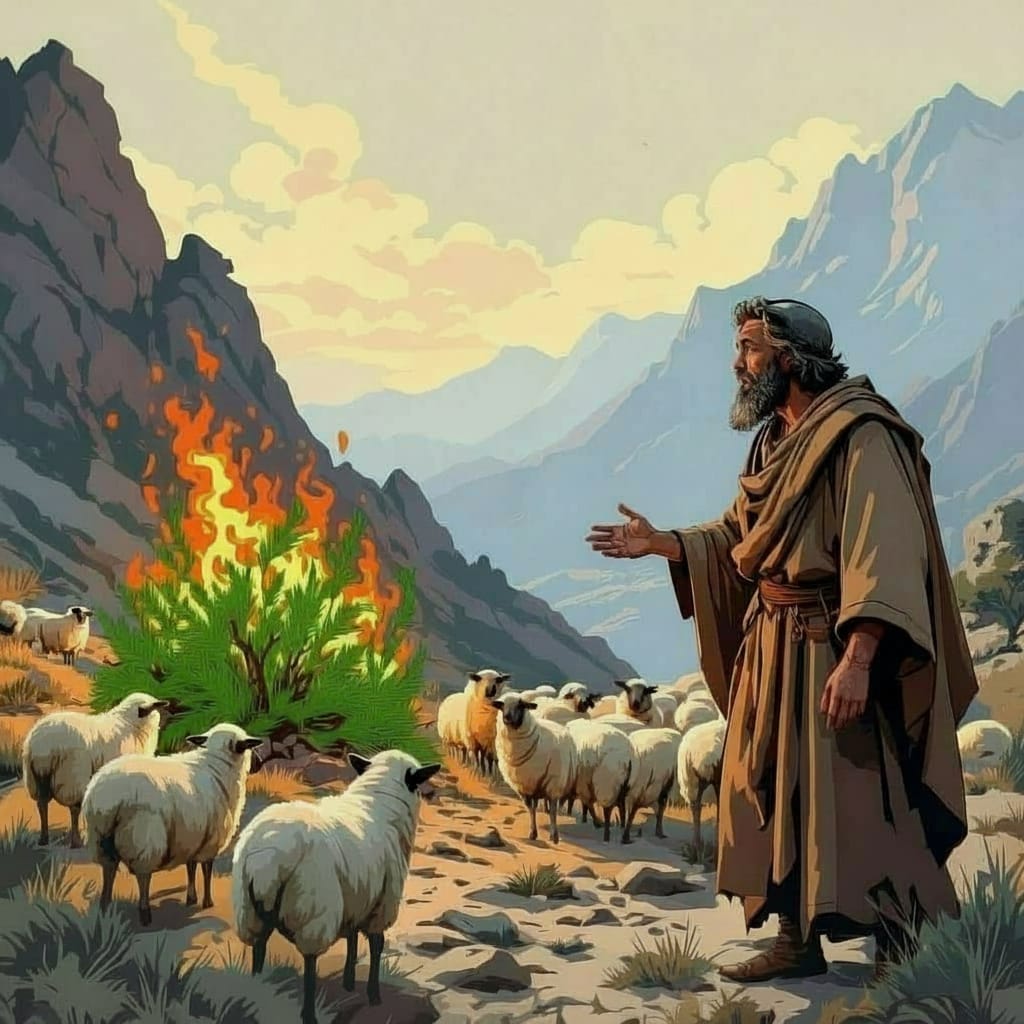
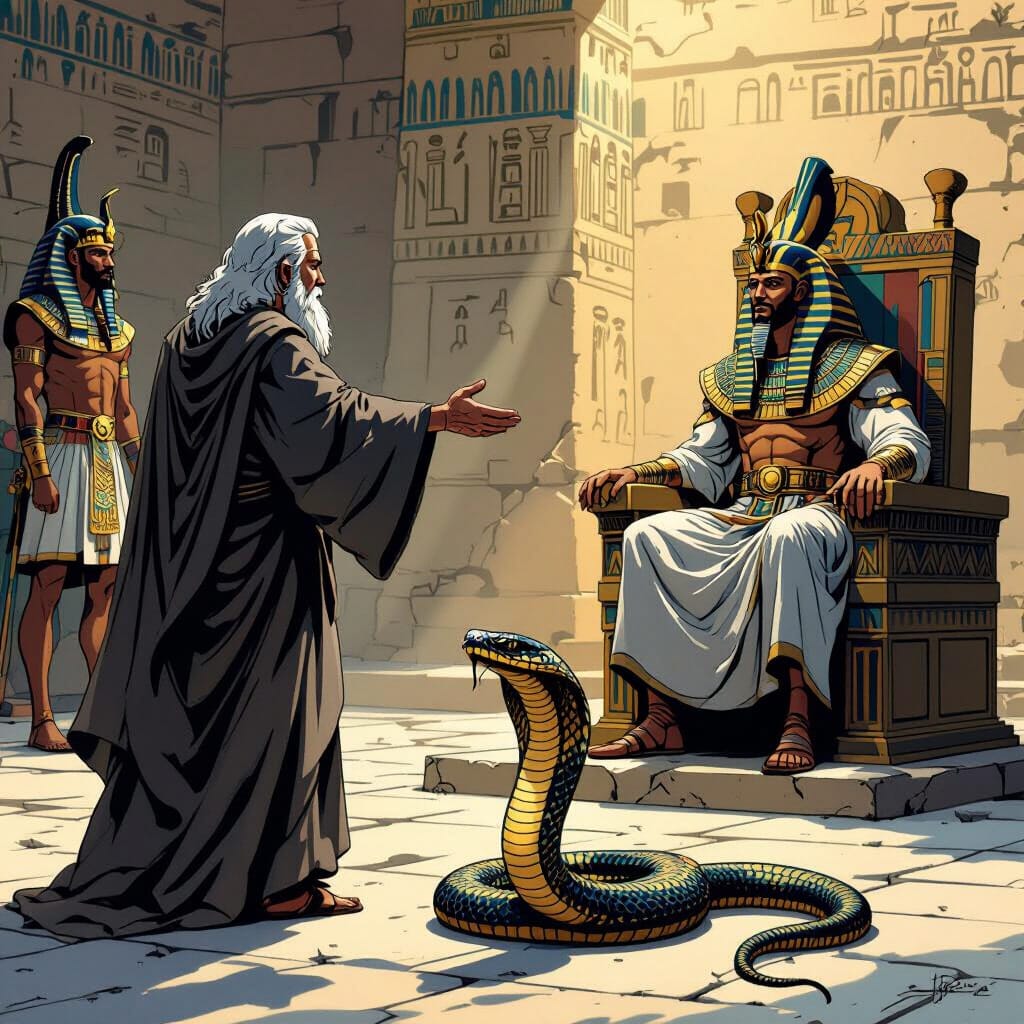
Moses and Aaron went before Pharaoh with their request to let their people go, under the guise of holding a feast in the wilderness and making animal sacrifices to God. Pharaoh not only refused to let the Hebrews go, but he increased their slave labors. The Hebrews questioned Moses, and Moses questioned God (Exodus 5).
God gave Moses a stern pep talk and sent him and Aaron back to Pharaoh. This time, God instructed them to throw down the rod to make it become a snake. Pharaoh’s heart was hardened, however, just as God had spoken. Moses and Aaron were then instructed to turn all of Egypt’s water into blood in the sight of Pharaoh, killing the fish and making it unfit to drink (Exodus 7).
A series of plagues began, each accompanied by a warning of another if Pharaoh didn’t let the Hebrews go. After the water returned to normal in a week’s time, a plague of frogs came from out of Egypt’s water. Pharaoh promised to let the people go if the frogs went away, but he went back on his word when piles of dead frogs caused the land to stink. Then came lice throughout all the land of Egypt. Next came swarms of flies. Pharaoh again said he would let the people go, but didn’t (Exodus 8).
Next, all the cattle of Egypt died, while not one of the cattle of the children of Israel. Then a plague of boils came on all the Egyptians. Then the worst hail storm in history which killed Egyptians, animals and plants in the fields, but didn’t fall on the Israelis. Pharaoh again conceded in word, but not in deed (Exodus 9).
So Egypt was overrun with locusts which ate everything not destroyed by the hail. Pharaoh again went back on his word, and God brought darkness over the land of Egypt for three days, while the Israelites had light in their houses. Pharaoh continued trying to negotiate who, and what animals, could leave Egypt, in an attempt to bring the Hebrews back after their celebration and sacrifice to God (Exodus 10).
God then told Moses there would be one last plague. That all the firstborn of man and animals in Egypt would die, including Pharaoh’s son. He gave the Hebrews favor with the Egyptians and told them to gather all the gold, silver and clothing from them (Exodus 11).
God then gave the Israelites specific instructions on how to sacrifice a lamb, and rub its blood on the top and side posts of their doors, and roast and eat the lamb and unleavened bread hastily that (cont.)
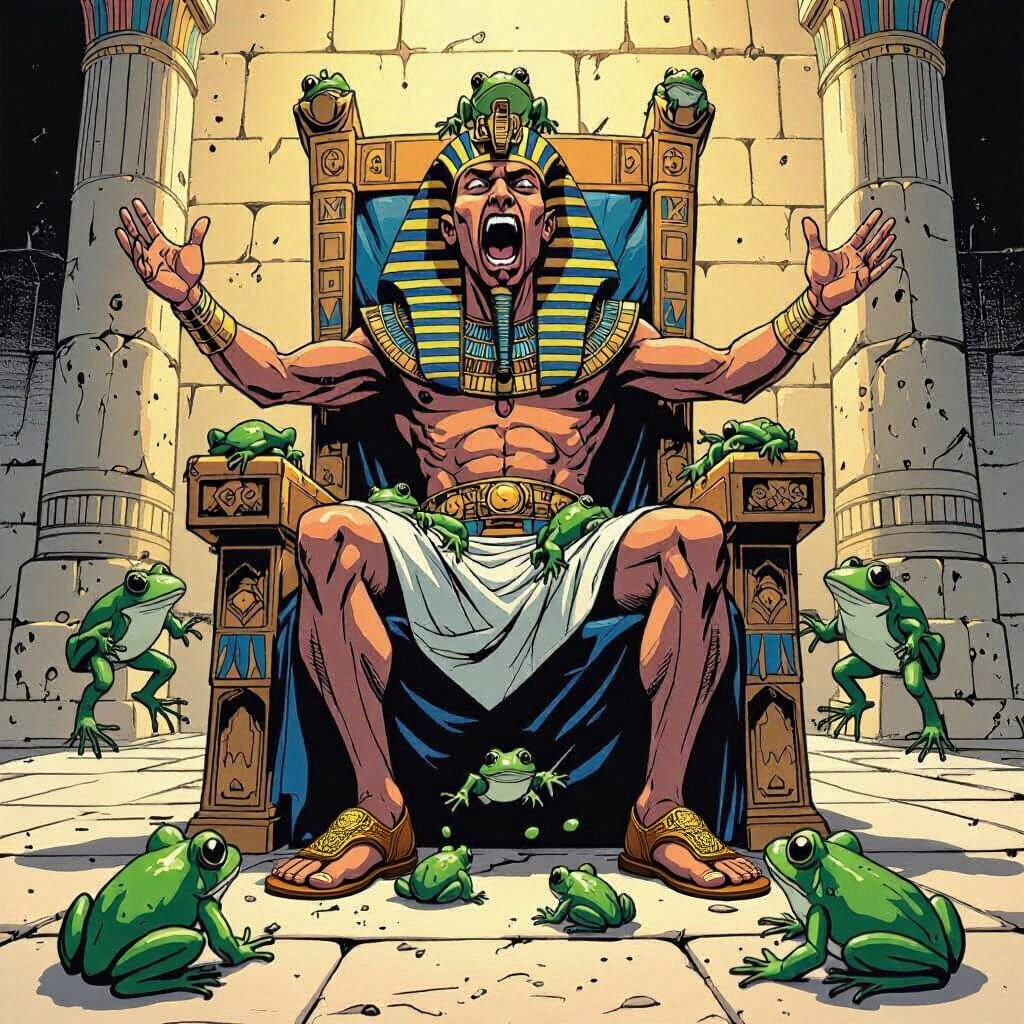
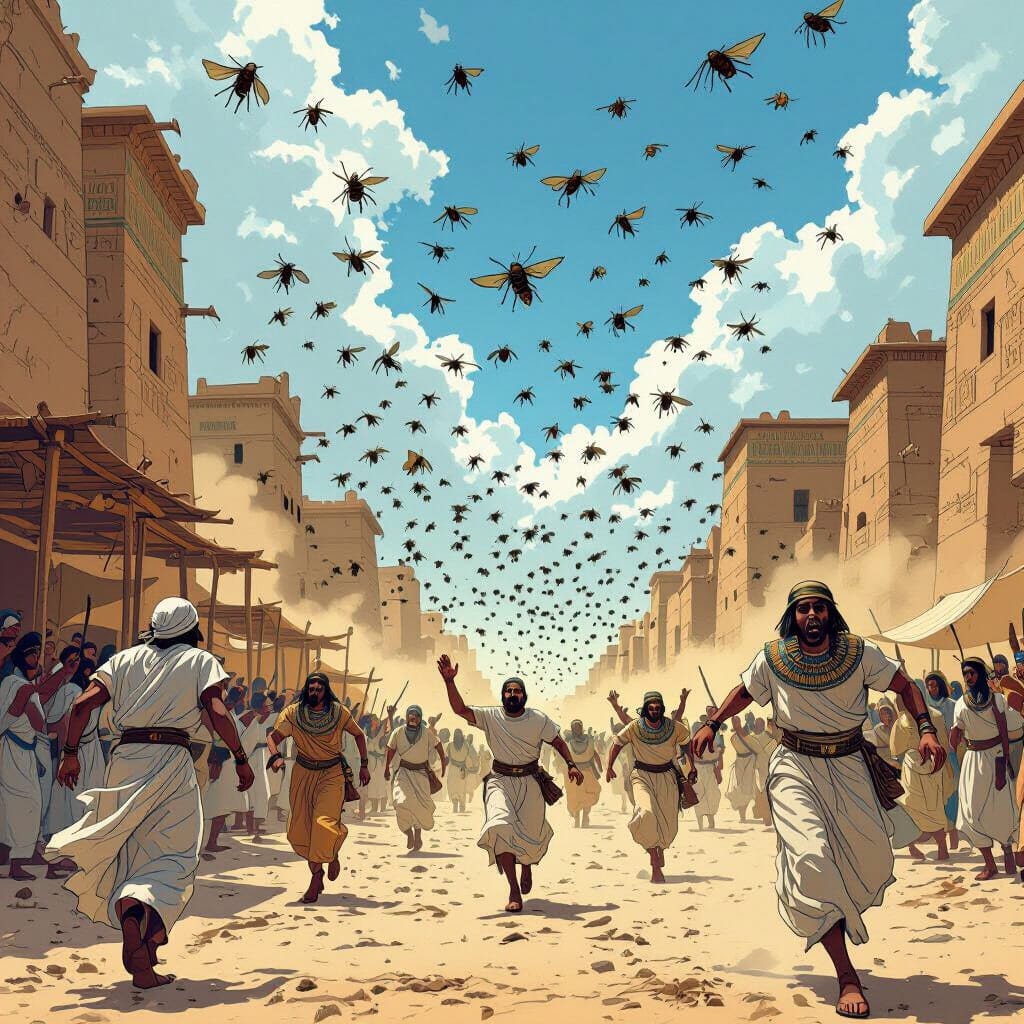
night while fully prepared to leave Egypt. God established this as an annual Passover feast because he would pass over every house marked with the sacrificial blood (another sign of Jesus’ blood being our sacrifice). And all these things came to pass. After 430 years in Egypt, the Israelites, now with 600,000 men, plus women and children, left Egypt with all their flocks, herds, possessions, and the spoils of Egypt (Exodus 12).
When the Israelites left Egypt, God led them to the Red Sea with a pillar of cloud by day and a pillar of fire by night (Exodus 13).
When Pharaoh received word that the Israelites left in the night, he chased after them with six hundred chariots and army captains and horsemen, and all his army. They caught up with them by the Red Sea and the Israelites complained that it would have been better to serve the Egyptians than to die in the wilderness. Moses assured them that they were about to see the Lord fight for them. God told him to lift up his staff and stretch out his hand over the sea and divide it, and that the Israelites would walk through the midst of the sea on dry ground. And that Pharaoh and his armies would pursue and be drown in the sea. The pillar of cloud moved between (cont.)
the camp of Israel and the Egyptian camp to hold them off with darkness, but the pillar of fire provided light to the Hebrews. Moses parted the sea and the Israelis crossed over on dry ground between two walls of water. In the morning, the Egyptian chariots pursued the Hebrews through the divided sea and God popped off their chariot wheels to slow them down. When all the Hebrews had crossed the sea, He told Moses to stretch forth his hand to cause the waters to fall on the Egyptian army. He did, and every last one of them were drowned. Israel believed on the Lord and His servant Moses (Exodus 14).
Not long after their deliverance from Egyptian slavery, God led Moses up onto Mount Sinai, where He had first spoken to him through the unconsumed burning bush. There, He gave Moses the Ten Commandments and etched them into stone tablets. There was thundering and lightning and smoke on the mountain. God spoke to the people like the noise of a trumpet, but the people feared Him and wanted Moses to be the only one who spoke with God (Exodus 19-20).
The people of Isreal quickly fell into disobedience, making a (cont.)
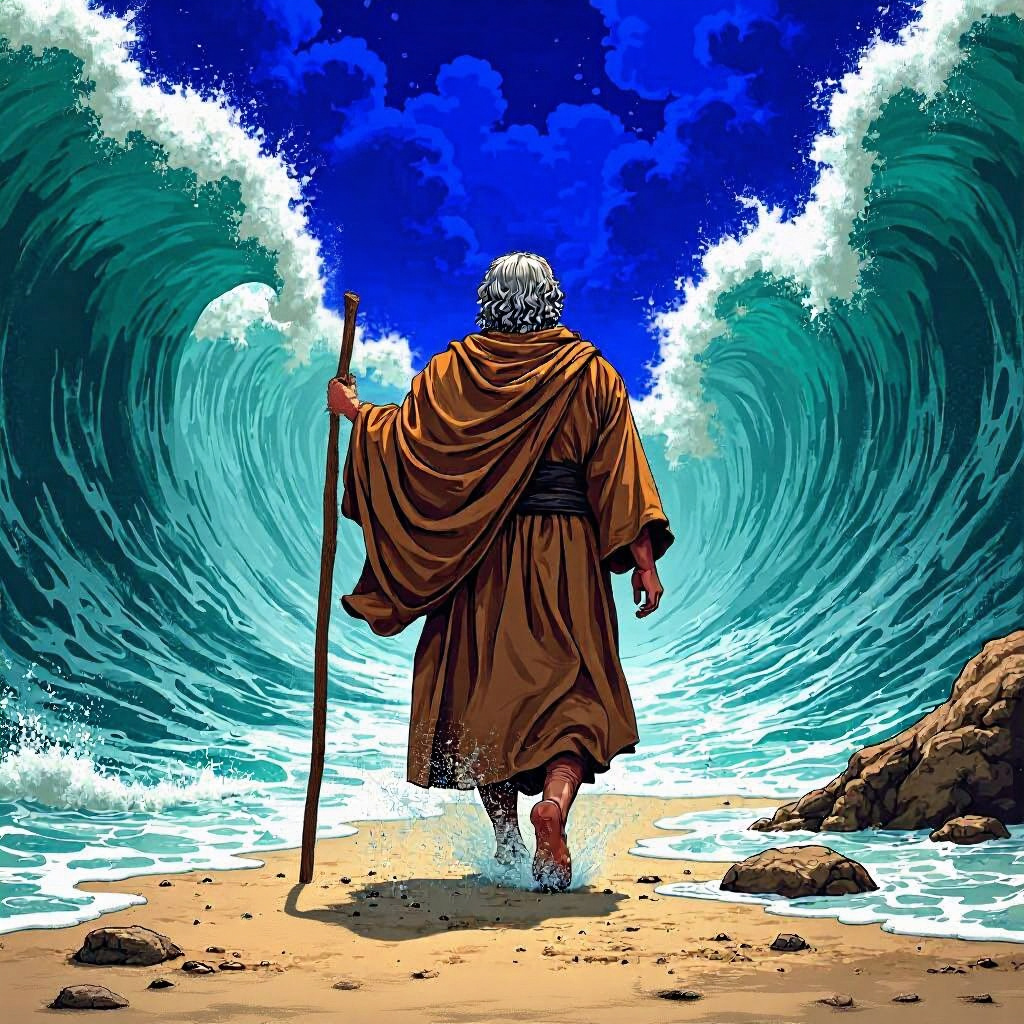
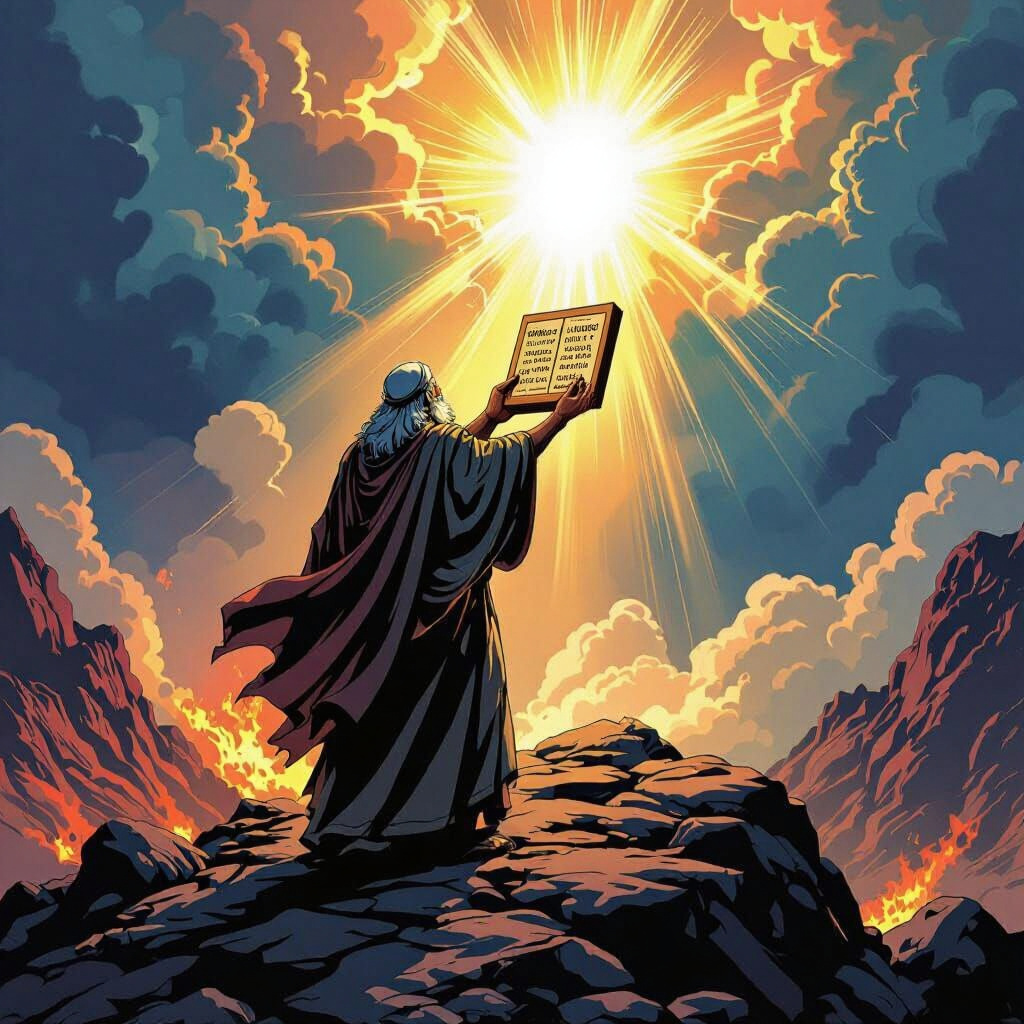
golden calf idol to worship while Moses was on the mountain for an extended period (Exodus 32).
Most also doubted Him and feared the Canaanites when He told them to enter the promised land (Numbers 13, 14). This led to a rebellion by many Israelis against God and Moses and a punishment of wandering in the wilderness for 40 years. Joshua and Caleb, who had kept the faith, were the only ones 20 years and older to enter the promised land (Numbers 13-16).
God showed Moses the promised land before he died at 120 years old, but called Joshua to enter the promised land (Deuteronomy 34, Joshua 1).
Joshua & Rahab
When Moses died, the Lord spoke to Joshua, his proven minister who had given a faith-filled report 40 years earlier when spying out the promised land of Canaan. God told Joshua that He would be with him as he was with Moses, and that no man would be able to stand against him all the days of his life if he stayed courageous and followed His commandments. Joshua addressed the people with the same encouragement and told them they would be taking the promised land in three days. The people pledged their commitment to Joshua and the Lord (Joshua 1).
Joshua sent two men to spy out the land across the Jordan River, including Jericho, a major walled city. They entered the city before the gate was closed for the night. A harlot named Rahab let them stay in her house, located on the wall, but someone spotted them coming in and reported it to the king of Jericho. When the king arrived at Rahab’s house, she had hidden them on her roof under stalks of flax. She told the king they left the city just before the gate was closed. He believed her and sent men out after them. Rahab told the Israeli spies that she had heard of the mighty works God had done for them, including parting the Red Sea. She said all the (cont.)
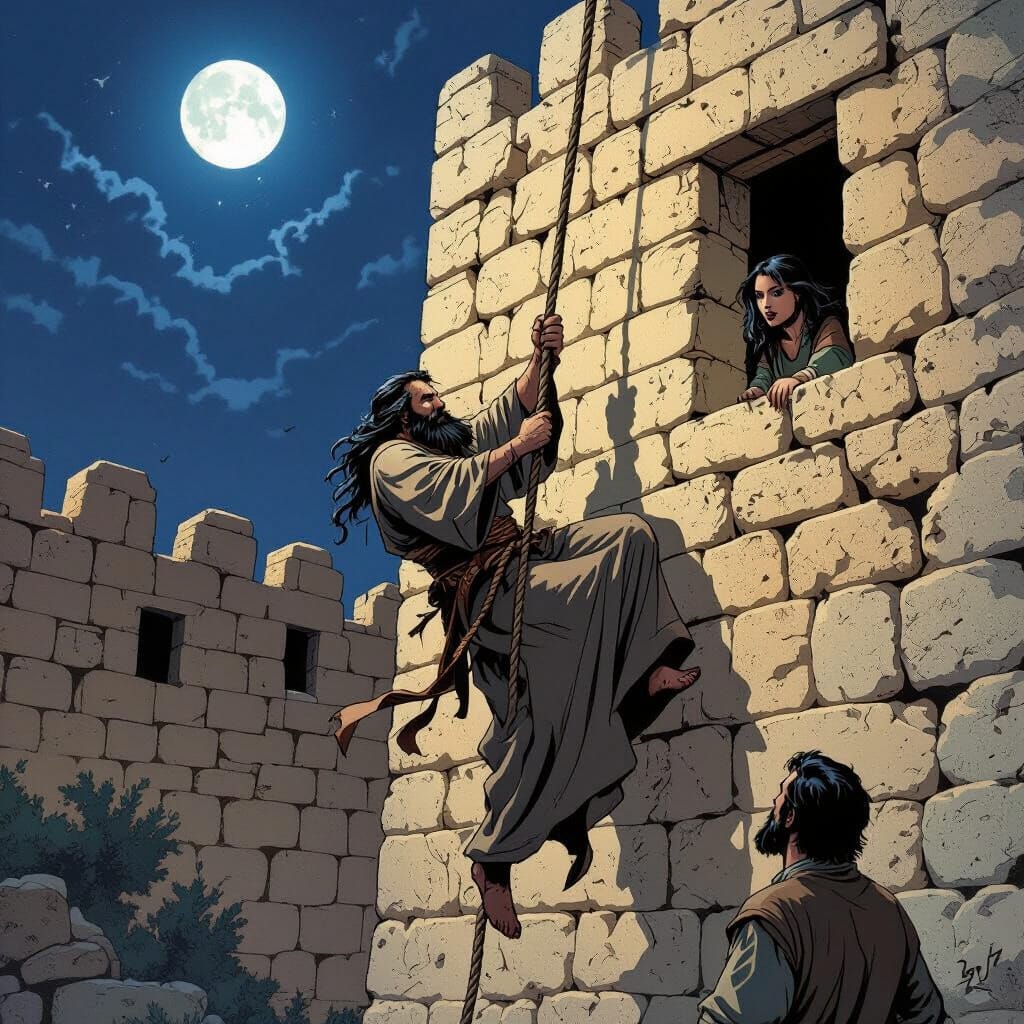
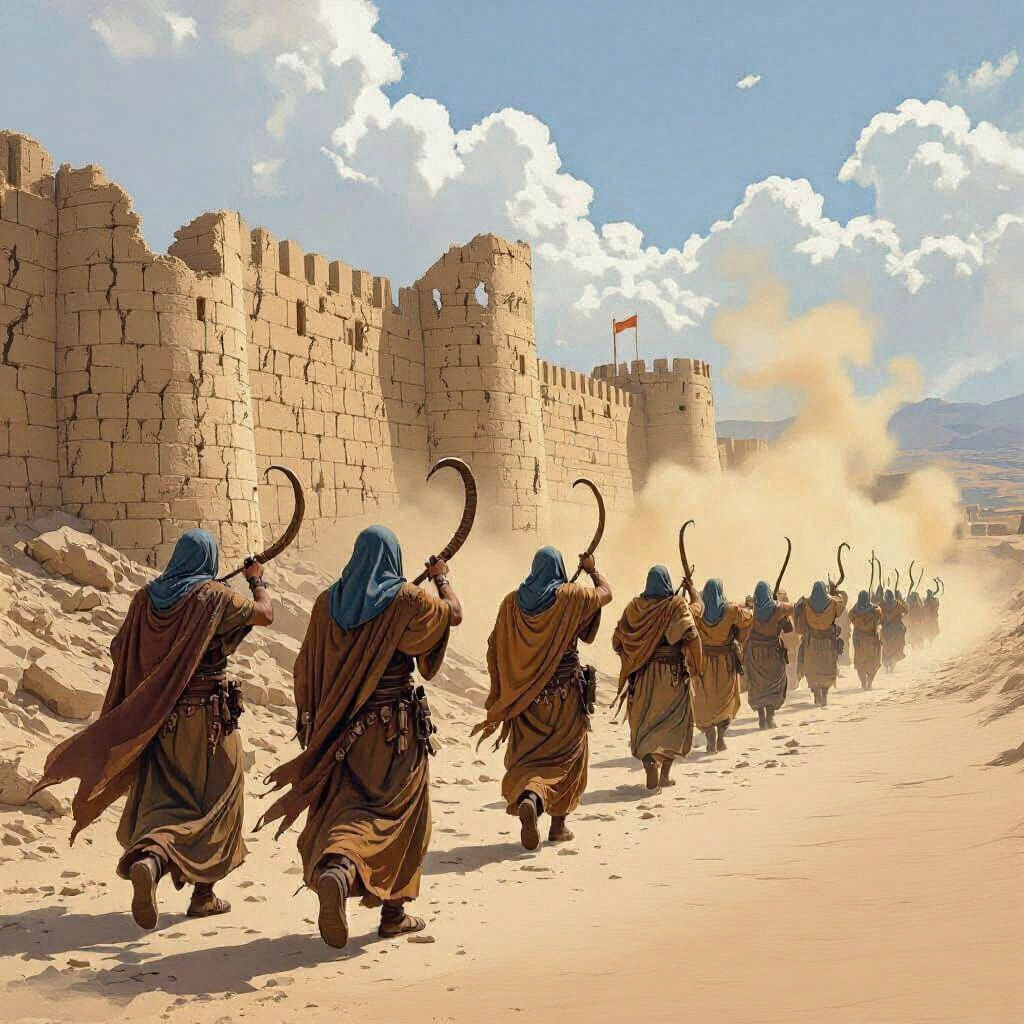
inhabitants of the land fear them, and proclaimed “The Lord your God He is God in heaven above and in the earth beneath.” She asked them to spare her and her family from the inevitable destruction. The men agreed, as long as she kept everything secret, and had her whole family in her house with a scarlet cloth tied to the window, during the attack in three days. She let them down from her house outside the city wall by a cord, they avoided the soldiers sent after them, and made it back to their camp. They reported everything that had happened, and the fear the people had of them (Joshua 2).
After three days, The Lord spoke to Joshua and said He would show all of Israel that, as He was with Moses, so He will be with him. Joshua gave the people instructions to sanctify themselves and for the priests to take the ark of the covenant ahead of the them. He told them the Lord was going to block the flow of the Jordan River as soon as the priests stepped into it. And it was so. The overflowing river built up in a heap, leaving dry ground for them to pass over. The priests stood still in the river bed until all the people passed over directly to Jericho (Joshua 3).
All the kings of the Amorites to the west, and all the kings of (cont.)
the Canaanites heard of the miracle and their hearts melted. Before advancing, the Israelites celebrated Passover and the Lord appeared before Joshua, identifying Himself as the captain of the host of the Lord. Joshua fell to his face and worshiped Him (Joshua 5).
Jericho was completely shut, with no one going out or coming in, for fear of the children of Israel. The Lord gave Joshua instructions on how to conquer the city and they carried it out. Without speaking a word, all the men of war (around 40.000) surrounded the city and walked around the city once, for six days in a row. Seven priests went before the ark blowing seven trumpets of rams’ horns. On the seventh day, they all circled the city seven times and the priests blew the trumpets with one long blast. Upon this signal, all the people shouted, and the wall of the city fell down flat. Every man charged ahead and took the city. Joshua sent the two men that had spied out the city to go to Rahab’s house and bring her and her family out safely. They lived with the Israelites from that point on (Joshua 6).
The kings of many cities came against Israel, but the Lord delivered Israel from all of them. Thirty-one kings in all (Joshua 11-12).
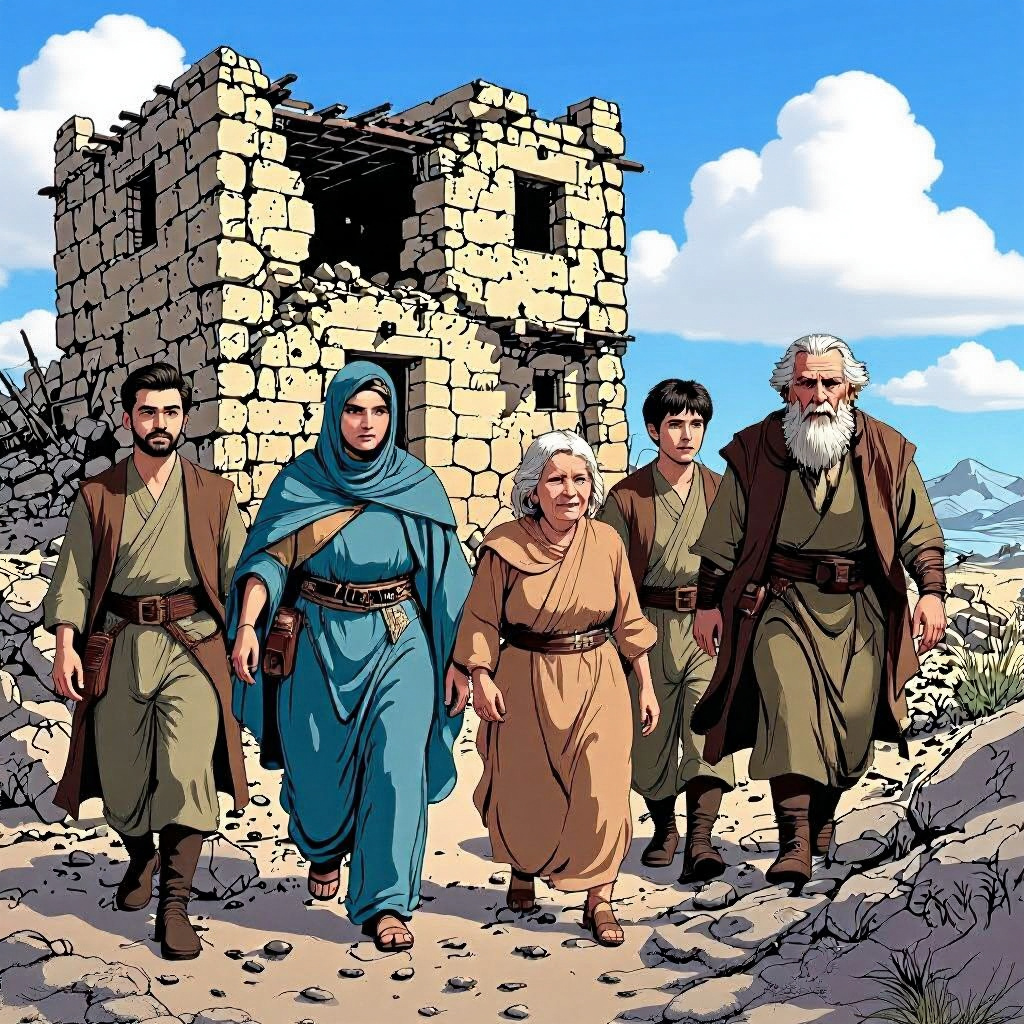
Samson
When the Israelites again did evil in the sight of God, He allowed their enemies, the Philistines, to rule over them. After 40 years, God appeared to the childless, barren wife of Manoah and told her she would bear a son who would be a Nazarite from birth, set apart for service to the Lord. That he would never drink wine or eat any animals deemed unclean, and his hair could never be cut. God said he would deliver Israel out of the hand of the Philistines. God reaffirmed these things to Manoah soon after, with another visit. The message was confirmed with the birth of their son, Samson. As he grew up, the Spirit of the Lord began to move in him from time to time (Judges 13).
When reaching adulthood, Samson told his parents he wanted to marry a certain Philistine woman, which was forbidden in the Israelite tradition. They protested, but didn’t realize he wanted to provoke the Philistines. On his way to see her, a lion attacked him and the Spirit of the Lord came upon him mightily. He tore the lion apart with his bare hands. After getting to know the Philistine woman, Samson came again to see her. On his way, he saw the lion carcass. In it was a swarm of bees and a honeycomb, from (cont.)
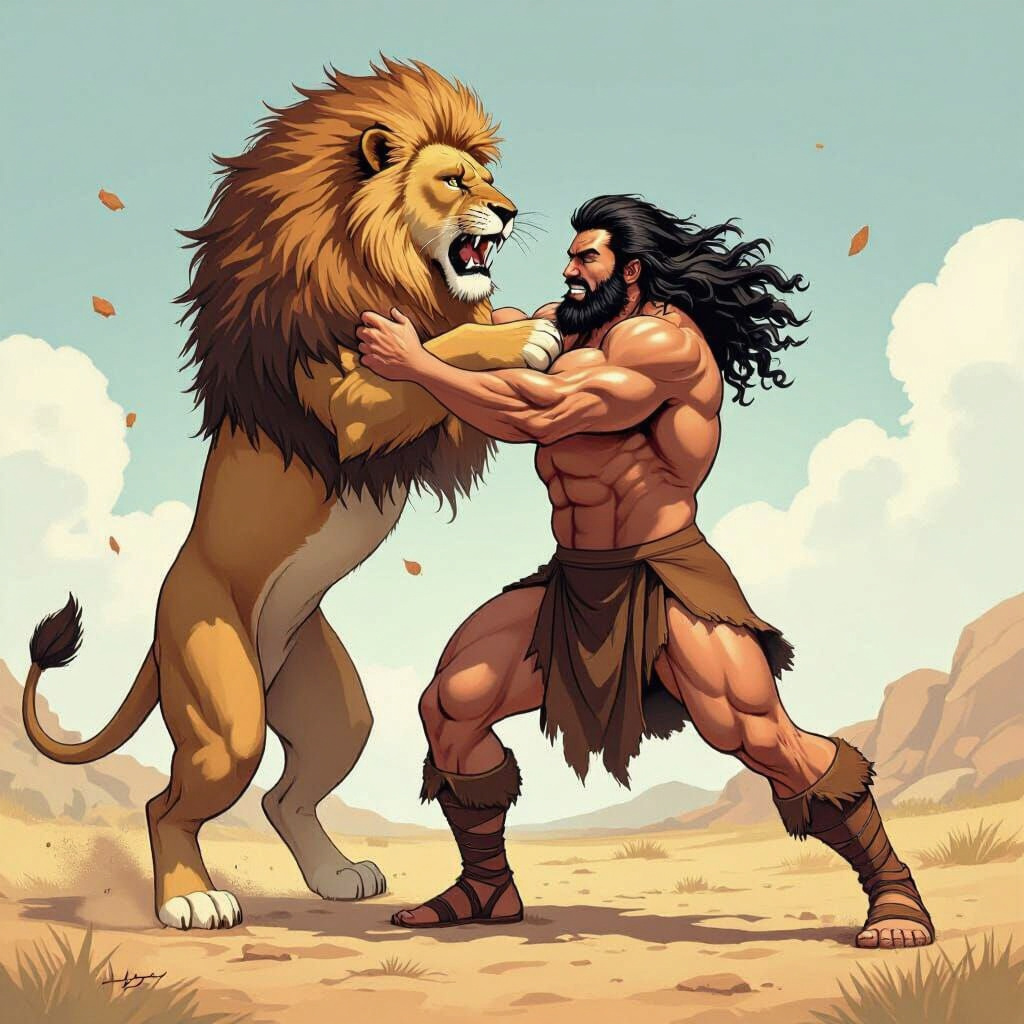
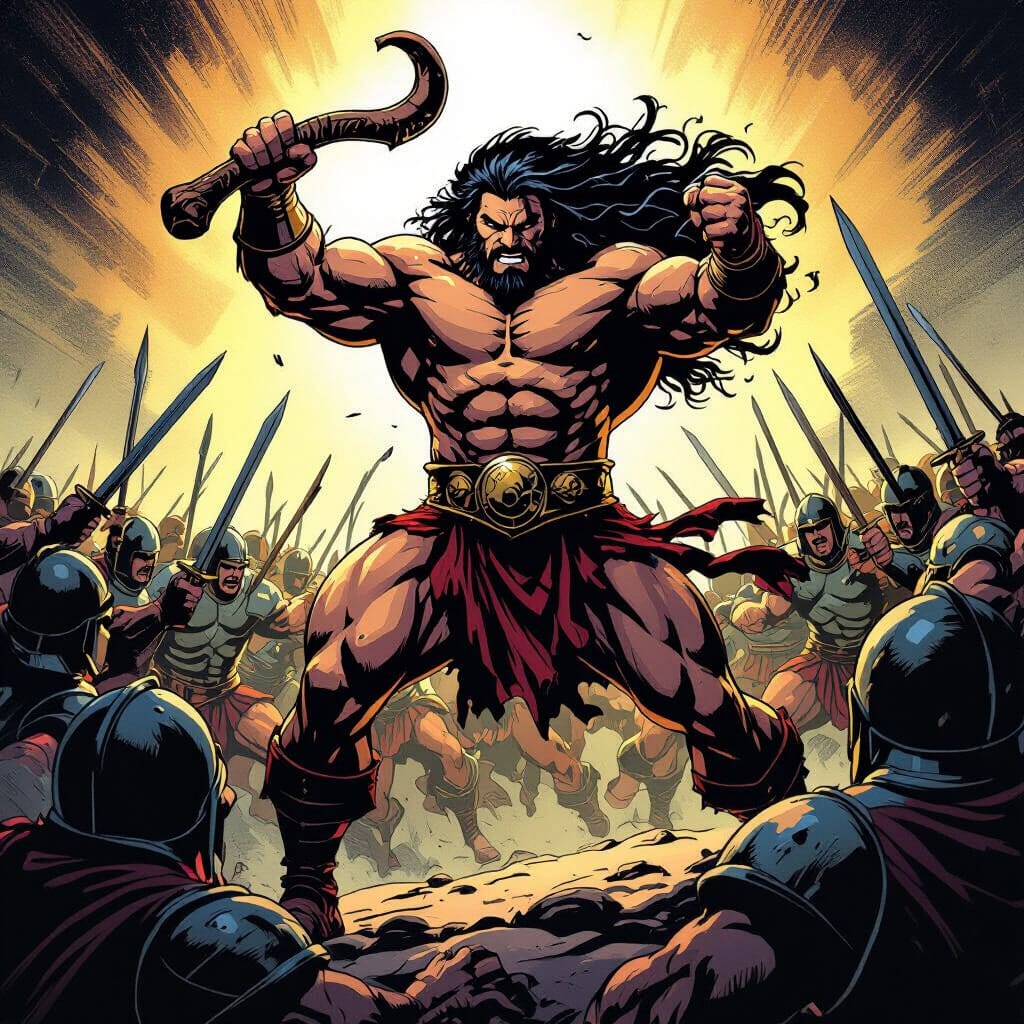
which he took and ate. When he married the woman, they had a seven-day feast at her father’s house and invited 30 Philistine men as guests. While entertaining the guests, he put forth a riddle about the lion and the honey: “Out of the eater came forth meat, and out of the strong came forth sweetness.” He made a wager of 30 sheets, and 30 garments if they could solve the riddle during the feast. On the seventh day, no one had solved the riddle so the Philistines privately threatened Samson’s wife with her death and that of her family, so she pressed him for the answer to the riddle until he gave in. When they produced the answer on the last night, Samson knew they had threatened his wife. The Spirit of the Lord came on him and he went to a nearby city and slew 30 Philistine men and took their garments as payment for the wager (Judges 14).
After Samson’s anger cooled, he returned to his father-in-law’s house to find that he had given her to another man, thinking he hated her for telling the answer to the riddle. This led Samson to escalate the conflict. He caught 300 foxes and tied their tails together by two’s, placing wood in the knots and lighting them on fire. He released the foxes into the Philistines’ corn fields and (cont.)
vineyards. In response, the Philistines burned his wife and father-in-law to death. Samson slaughtered many Philistines to avenge his loss. This caused 3,000 men of Judah, his own people, to attempt to turn him over to the Philistines out of fear for their lives. He allowed them to bind and take him to them, but, instead of giving himself up, the Spirit of the Lord came upon him and he broke free effortlessly. He picked up the jawbone of a donkey and slew 1,000 armed Philistine soldiers. For the next 20 years he was untouchable by the Philistines and unquestioned as the judge over his people (Judges 15).
Samson’s dedication to God, faltered, however. He went to a nearby city and visited a harlot. The people of the city saw him and surrounded him and laid wait inside the city gate. But Samson ripped the doors, posts and bar of the gate right off and carried them on his shoulders to the top of a hill near Hebron. He later had a sinful relationship with an ungodly woman named Delilah. She betrayed him to the Philistine leaders for many pieces of silver. Like his former wife, she begged and manipulated him into telling her his secret—this time the secret to his strength and how to weaken him.
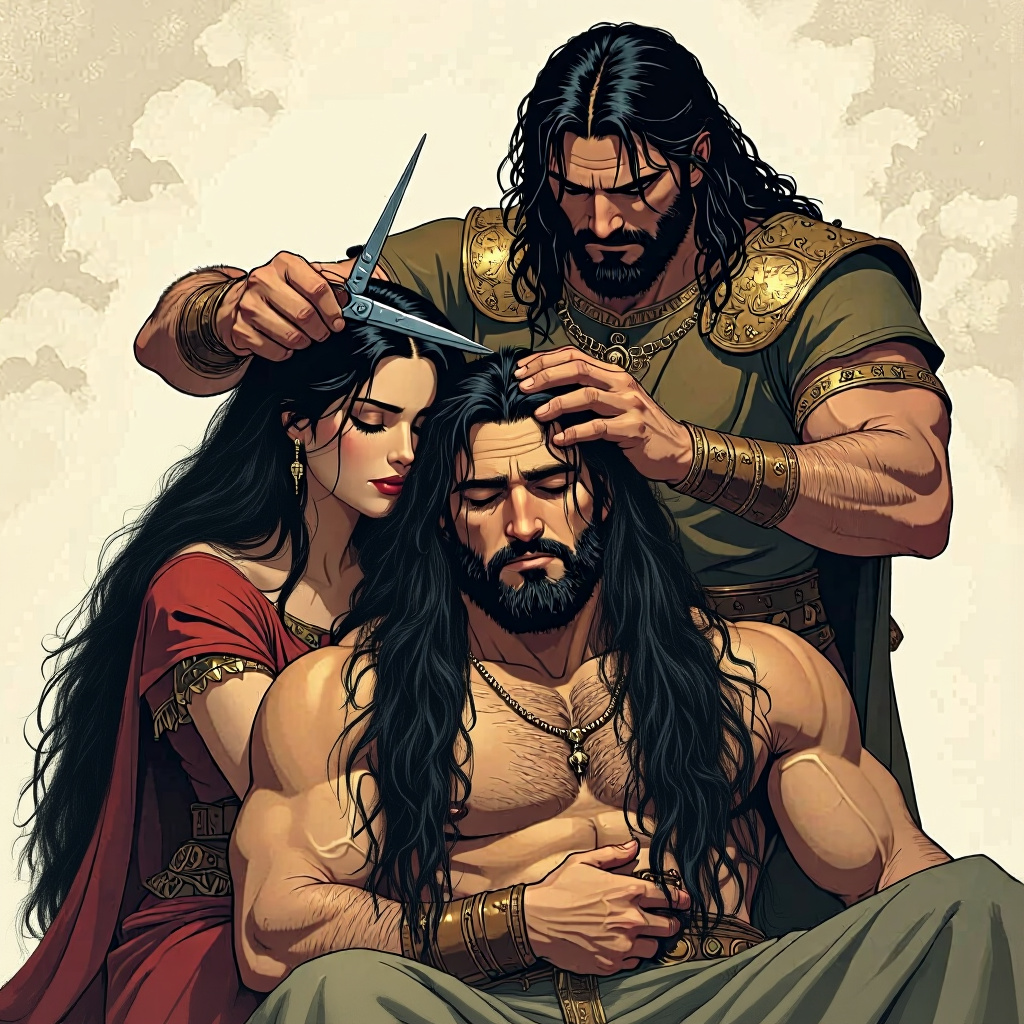
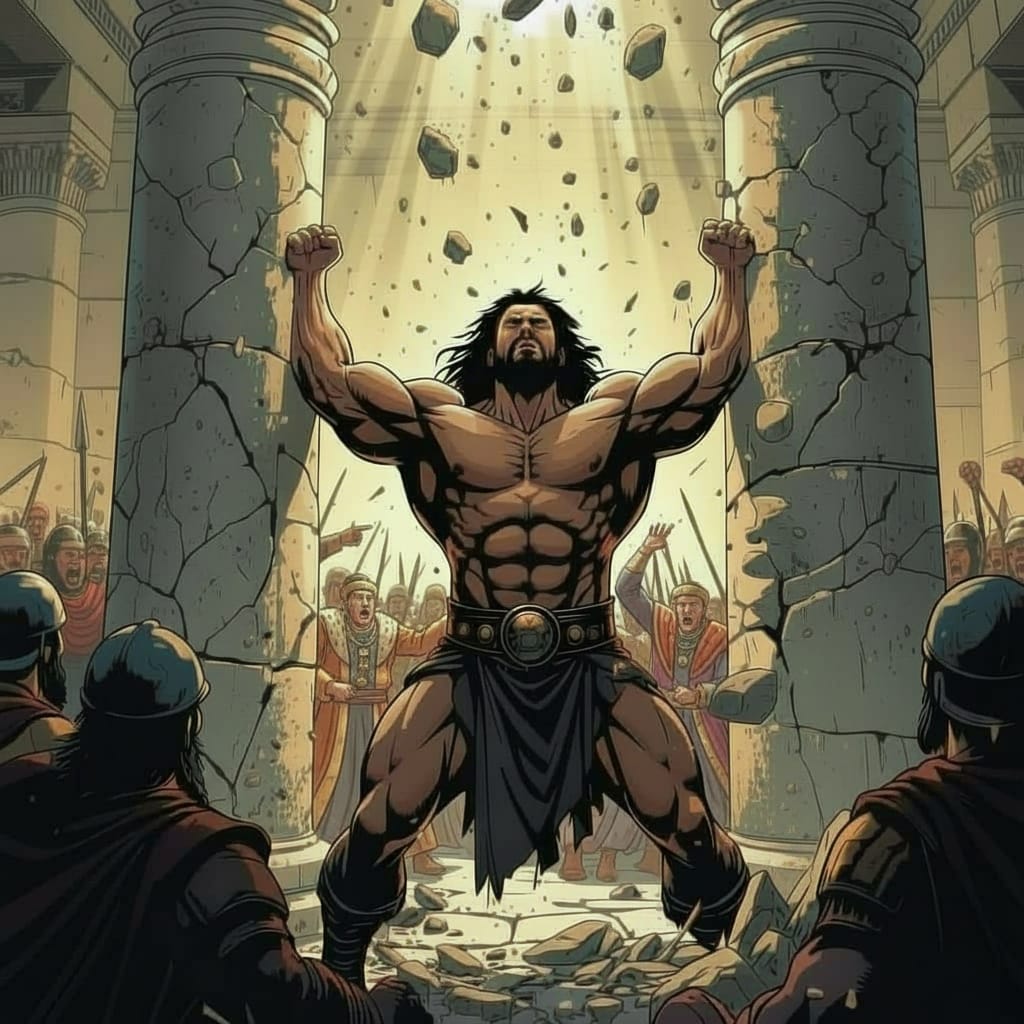
Three times he gave her false information, and each time she tried and failed to bind and weaken him. First with seven fresh cords, then new ropes, then by weaving the seven locks of his hair into a web. And each time the Philistines were lying in wait in her house. Finally, he told her the truth, which should have been an obvious mistake. He told her he would be as weak as a normal man if his head was shaved, due to his Nazarite vow being broken. She lulled him to sleep on her knees and called for a man to shave his head. His strength departed and the Philistines gouged out his eyes and bound him with brass to grind grain in a prison. But his hair began to grow back. A while later, thousands of Philistine leaders gathered in the temple of Dagon for a sacrifice to their god, and to celebrate the conquest of Samson, their mortal enemy. They brought Samson in to make fun of him and set him between the two main pillars of the temple (big mistake). Samson prayed to the Lord to be strengthened one last time to avenge his enemies, and he pushed the pillars with all his might and brought the house down…literally. He slew more enemies of God in his death than in his life (Judges 16).
Samson’s story shows us the forgiveness and redemption available from God when we humble ourselves and repent of our sins.
Ruth
In the days of the judges, there was a famine in the land of Judah. This led to a certain Hebrew family of four moving from Bethlehem to the land of Moab, where the God of Abraham, Isaac and Jacob wasn’t followed. The father died, leaving his wife, Naomi, alone with her two sons, Mahlon and Chilion. They married Moabite women named Orpah and Ruth. After ten years, both sons also died, leaving Naomi without her husband and sons. When word had spread to Moab that the Lord had provided bread for her people, she decided to move back to Judah. Both of her daughters-in-law wanted to go with her due tp their love for her, but Naomi didn’t want them to leave their parents and homeland, or to risk not finding new husbands. Orpah stayed, but Ruth insisted on going with Naomi due to their love for each other. Ruth also chose to follow Naomi’s God (Ruth 1).
A wealthy relative of Naomi’s late husband also lived in Bethlehem. His name was Boaz. Ruth began going to local fields to glean the corn, barley, and wheat left by the reapers. She happened onto the field of Boaz and asked the supervisor for permission to glean. When Boaz noticed her, and was told who she was, he offered her ongoing gleaning with protection from the male workers and (cont.)
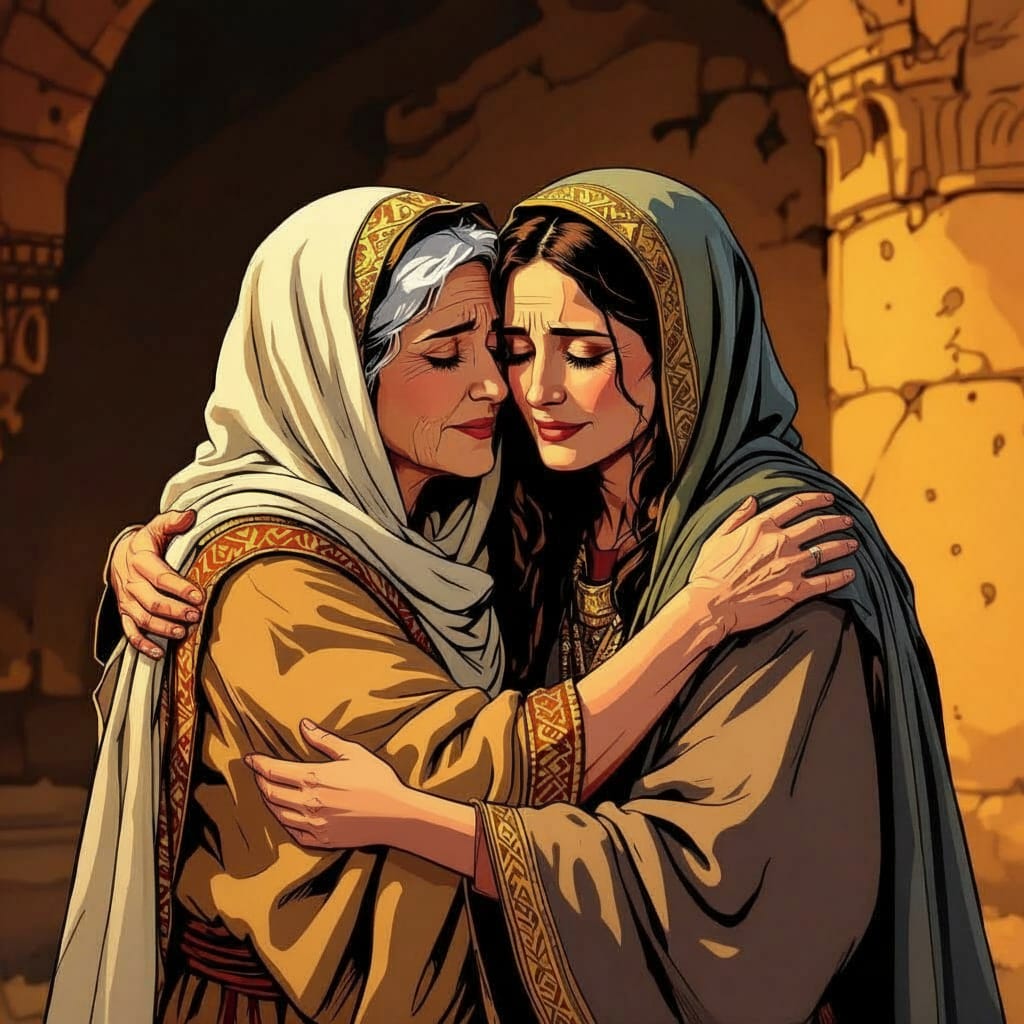

access to their drinking water. Being a lowly foreigner, Ruth was overwhelmed by his kindness. Boaz told her he had heard how she left her people for Ruth’s sake, and prayed a blessing from the Lord on her life. He added meals and gleaning among the sheaves to Ruth’s privileges, as well (Ruth 2).
Boaz later purchased Naomi’s land and married Ruth with the blessing of the Lord, bringing Ruth into the lineage of Naomi and the chosen people of God. The Lord gave her a son, named Obed. Obed would become the father of Jesse, who would become the father of David, the King of Israel (Ruth 4).
Boaz and Ruth becoming great grandparents to a physical king is a great blessing of God, but pales in comparison to becoming ancestors in the family line of the King of Kings and Lord of Lords, Jesus, the Messiah, the Savior of the world (Matthew 1).
So Ruth went from being a childless widow following false gods, to being married with children and having the one true incarnate God in her family line. This all resulted from her devoted love to her mother-in-law! Imagine that.
David
At an early age, David was anointed to be King of Israel by the prophet Samuel. Samuel thought God would choose the oldest and biggest son of Jesse, but God told him not to look on the outward appearance because He looks on the heart. God passed over David’s seven older brothers and Samuel had to inquire if Jesse had any more sons. Jesse had to call for David, who was tending the sheep. When he arrived, God told Samuel to anoint him to be the next king. The current king, Saul, was tormented by an evil spirit. His servants brought David to the king to play the harp and bring him peace. David gained favor with Saul (1 Samuel 16).
The Philistines soon gathered their soldiers for battle against the armies of Israel and Judah. Each army stood on a mountain with a valley between them. They would send out their nine-foot-nine-inch champion morning and evening to taunt and challenge the Hebrews to send out their best man to fight him for rule over the other. The Israeli army was afraid and trembled at Goliaths threats for 40 days. David had been tending his father’s sheep until this time, but his father sent him to the standoff to supply his brothers with food. As he arrived and greeted his brothers, Goliath came out and issued the challenge once more. David heard it and showed no fear, but expressed indignation that the uncircumcised Philistine would defy the armies of the living God. Eliab, David’s oldest brother, scolded him for speaking out, accusing him of false pride and wrong motives. But David didn’t back down. His words reached king Saul, and he called for David, who didn’t hesitate with an offer to fight the giant. Saul tried to dissuade him based on his youth and the giant’s experience as a man of war. David told Saul he had slain a lion and a bear when they took a lamb from his flock. Saul gave David permission, and offered his own armor and sword, but David hadn’t proved them. Instead, he took five smooth stones from the brook and a sling and headed toward Goliath. Goliath was insulted that they sent a mere boy, and threatened him. (cont. in image caption)
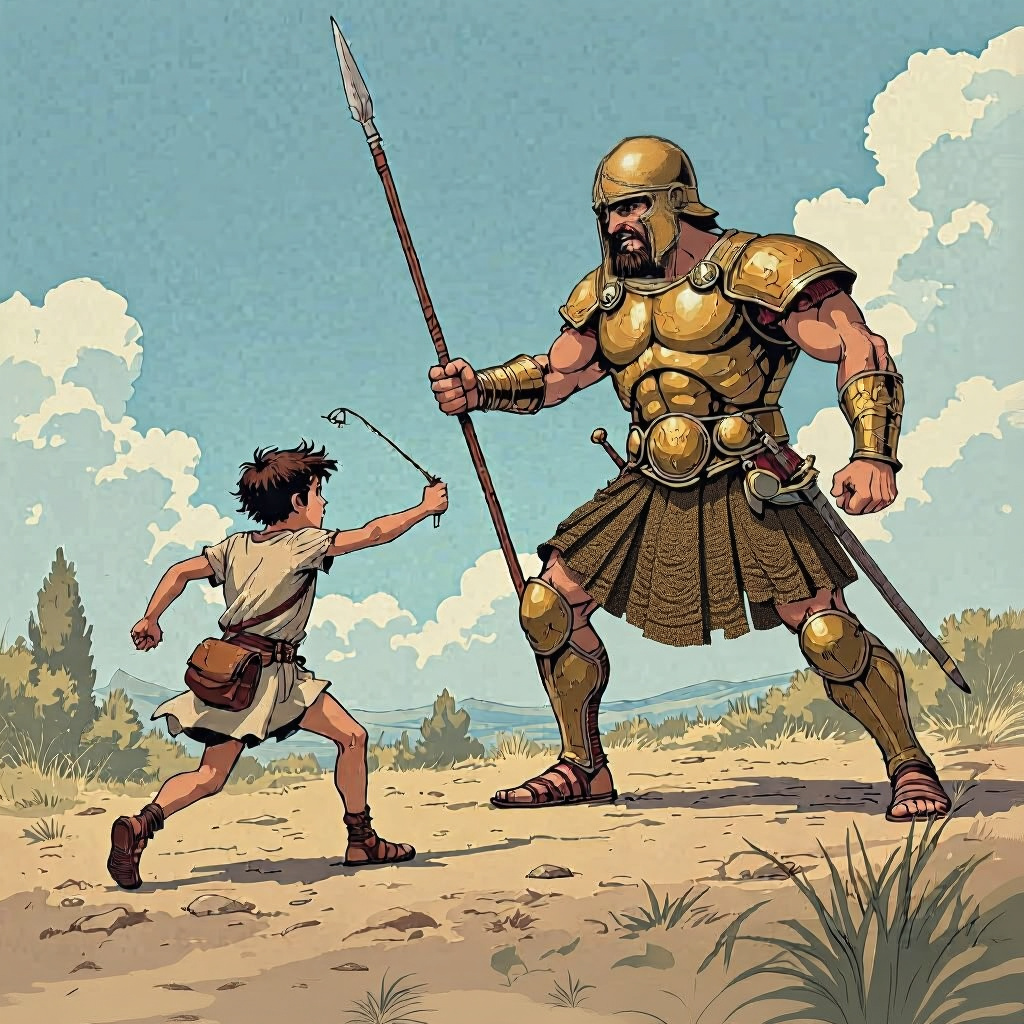
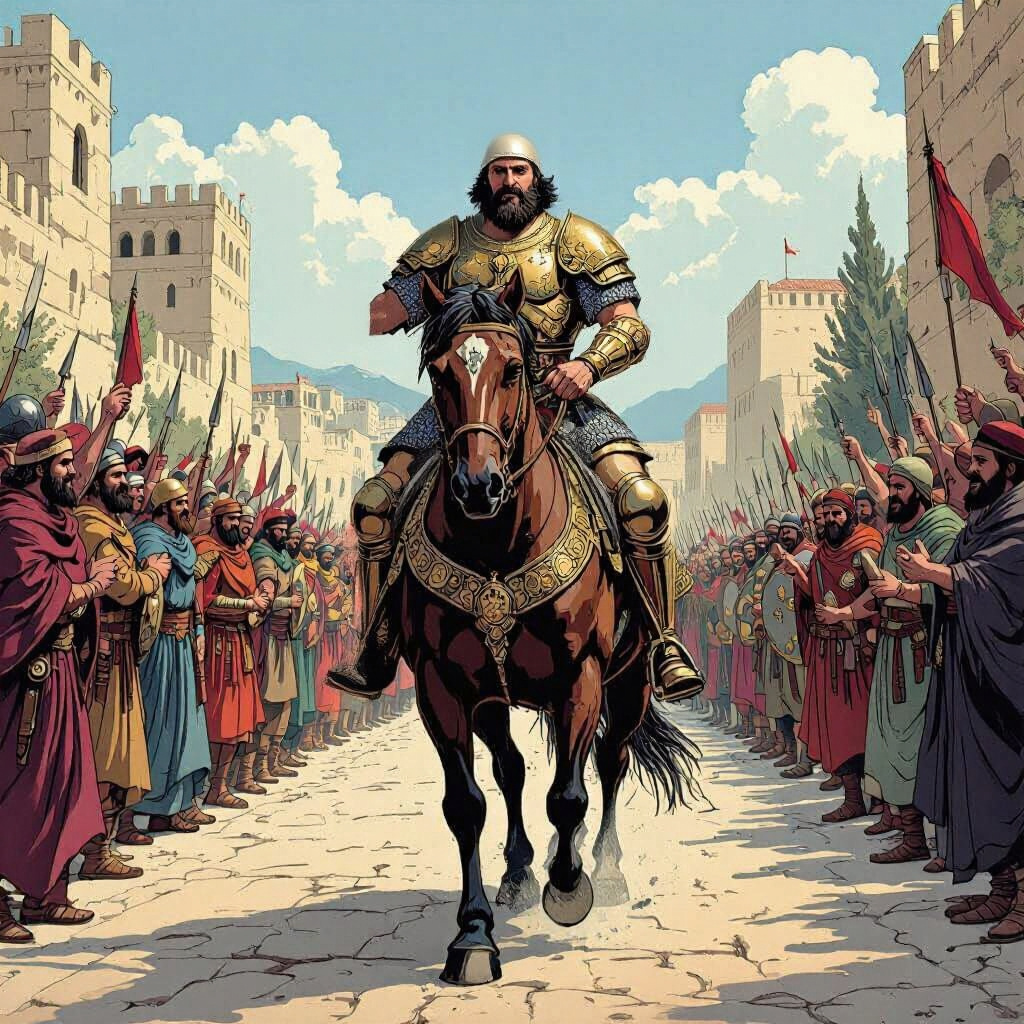
Then David ran toward Goliath and slung a stone, hitting his forehead and he fell on his face. David took Goliath’s sword and cut his head off. All the Philistines fled in terror and the Hebrews pursued them, wounding many (1 Samuel 17).
Saul’s son Jonathan loved David and willingly yielded his blood right to the throne. David led and won more and more battles as Saul sent him out. This made David the hero of his people, but made Saul very jealous. Saul even tried to kill him with a javelin when an evil spirit came upon him. David was forced to flee, even though he was anointed to be king. He behaved wisely and the Lord was with him (1 Samuel 18).
Saul again tried to have David killed, but Jonathan warned David and convinced his father to make peace. However, this lasted for only a short time, as David continued defeating the Philistines in battle and the evil spirit came back upon him (1 Samuel 20).
This tension continued until David had a chance to kill Saul on two occasions, but chose not to do it. Both times, David said he would not harm God’s anointed king (1 Samuel 24 and 26).
Eventually, Saul was seriously wounded in battle against the (cont.)
Philistines and chose to fall on his own sword (1 Samuel 31:3-6).
David was first anointed king over Judah by the people when he was 30 years old, then seven years later became king over Israel, as well. He reigned a total of 40 years. He became a great king and the Lord was with him. The Philistines continued trying to defeat him, but David was given favor and wisdom from God each time as to how to defeat them. And the Lord delivered them into David’s hand (2 Samuel 5).
However, David also had periods of serious sin, which grieved his soul. He committed adultery with Bathsheba and she became pregnant. To hide his sin, David attempted to give her husband time off from war to spend time with her and hide the identity of the true father. But he refused to take time off while others were at war. David then sent him to the front lines where he was killed. When David was confronted by the prophet Nathan, he repented and married Bathsheba (David wrote a song of repentance about these sins in Psalm 51). Still, the consequences of his sins were serious and long-lasting. The Lord allowed evil to rise up in his own house in the worst ways, including his wives committing adultery and (cont.)
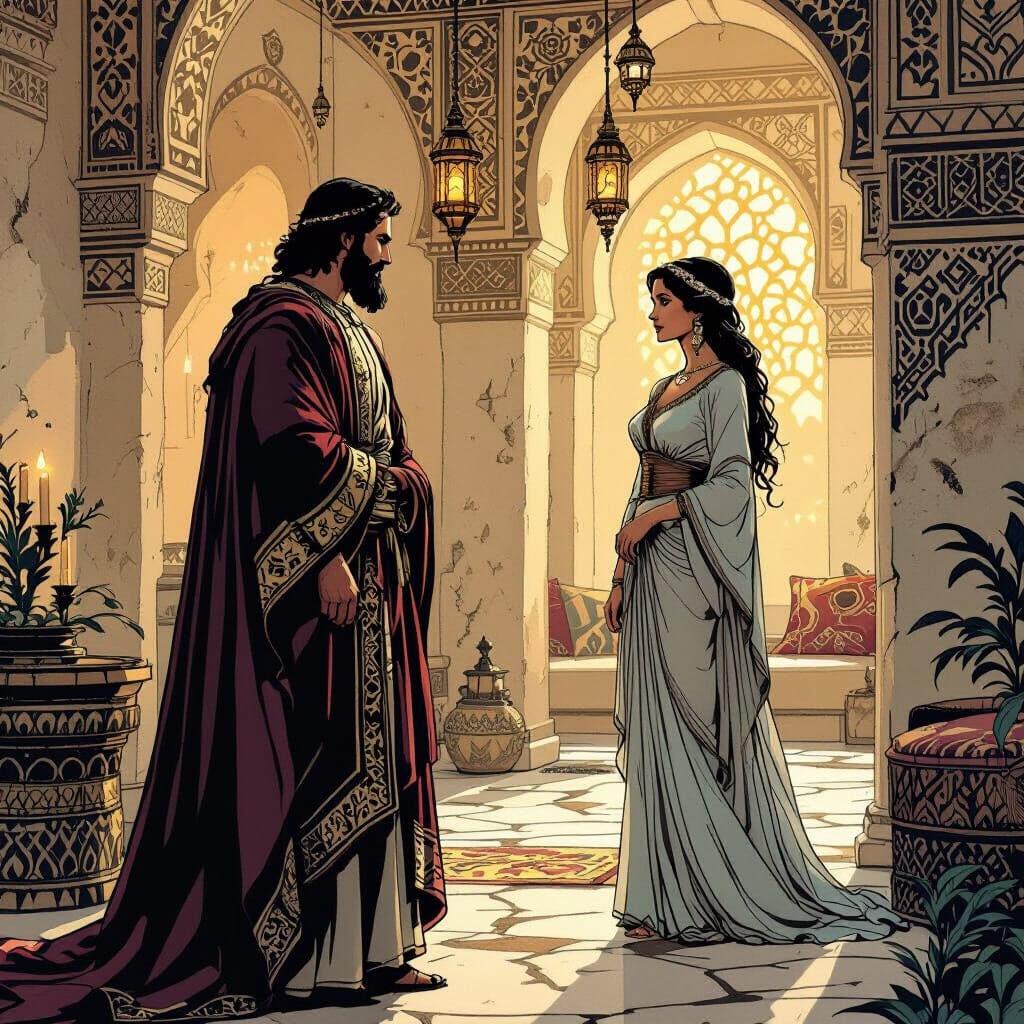
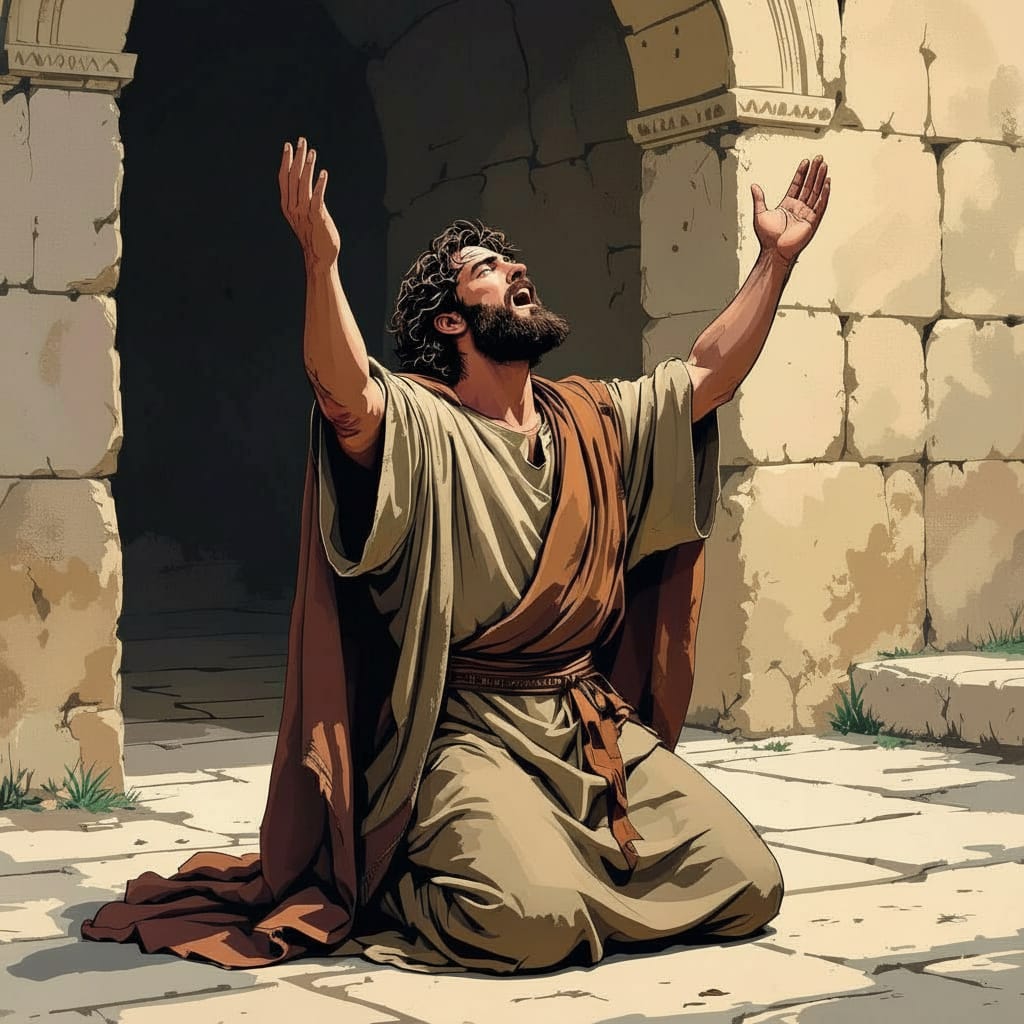
his child with Bathsheba getting sick and dying (2 Samuel 11-12).
If all that wasn’t enough, two of his sons, Absalom and Adonijah, attempted to take the throne away from him (2 Samuel 15-18,
1 Kings 1).
Despite David’s great sins, God’s mercy is greater, and He extended forgiveness to David and gave him a son, Solomon, who God blessed with great wisdom. Eventually, Jesus Himself was a direct descendant of David (Matthew 1:1).
Elijah
Elijah was a prophet used mightily by the Lord. When an evil king, more evil than any king in Israel before him, named Ahab, began his reign over Israel, Elijah stood against him. Ahab married Jezabel, a Baal worshiper, and raised up an alter to Baal. Elijah proclaimed that there would be no dew or rain until he spoke it. God called him to go east and stay by the brook Cherith to drink and be fed by ravens. The ravens brought him bread and meat in the mornings and evenings. After a while, the brook dried up from the drought and God directed him to go a widow woman in Zeraphath for sustinence. When he arrived, he found the woman preparing to make her last meal for her and her son before starving to death. He told her the Lord God of Israel would cause her meal and oil to last until God sent rain, if she would follow his directions. She obeyed, made Elisha a meal first, then they ate for many days. After a while, her son became sick and died. Elijah cried out to the Lord and asked that the boy’s soul would return to him again. The boy revived (1 Kings 16:28-34; 1 Kings 17).
In the third year, God told Elijah to go king Ahab, even though his wife Jezabel had all the prophets of the Lord killed. Elijah told Ahab to bring all of Israel and the 450 prophets of Baal to mount Carmel.
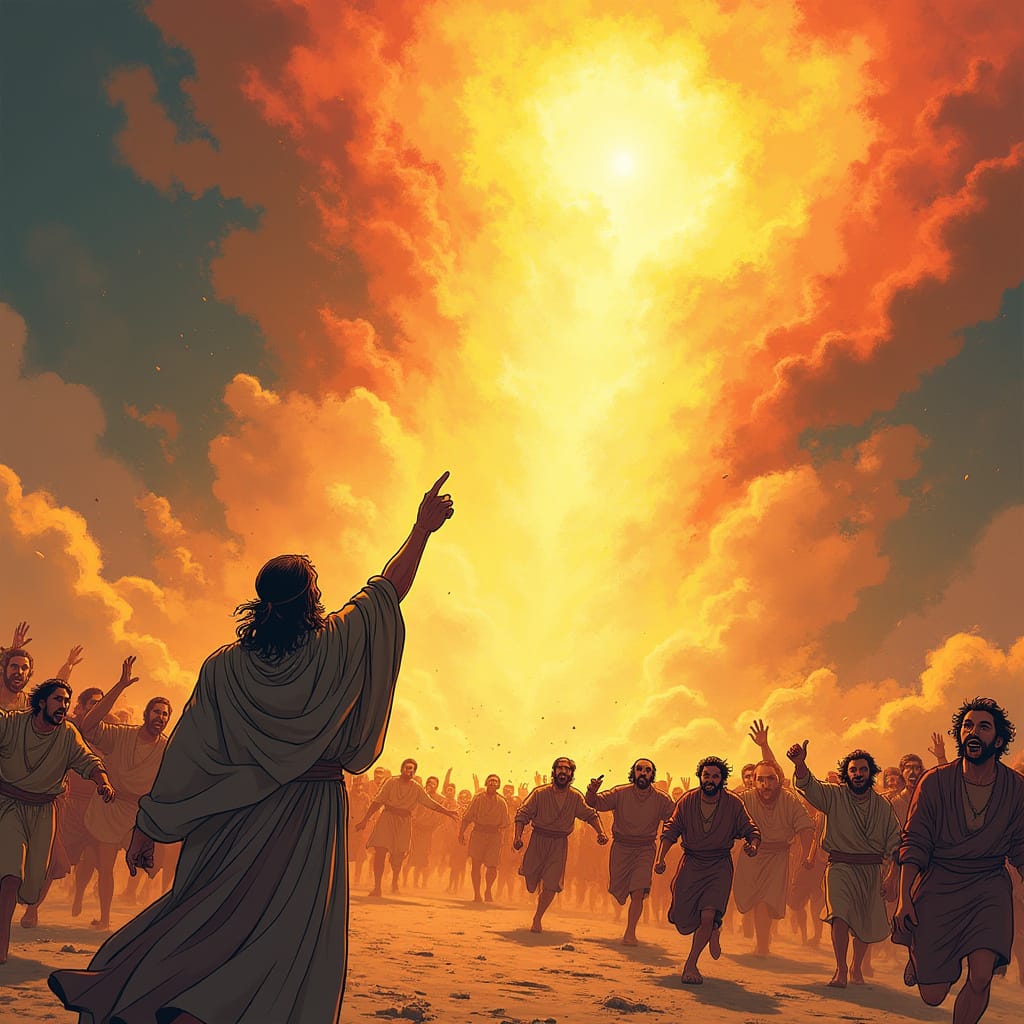
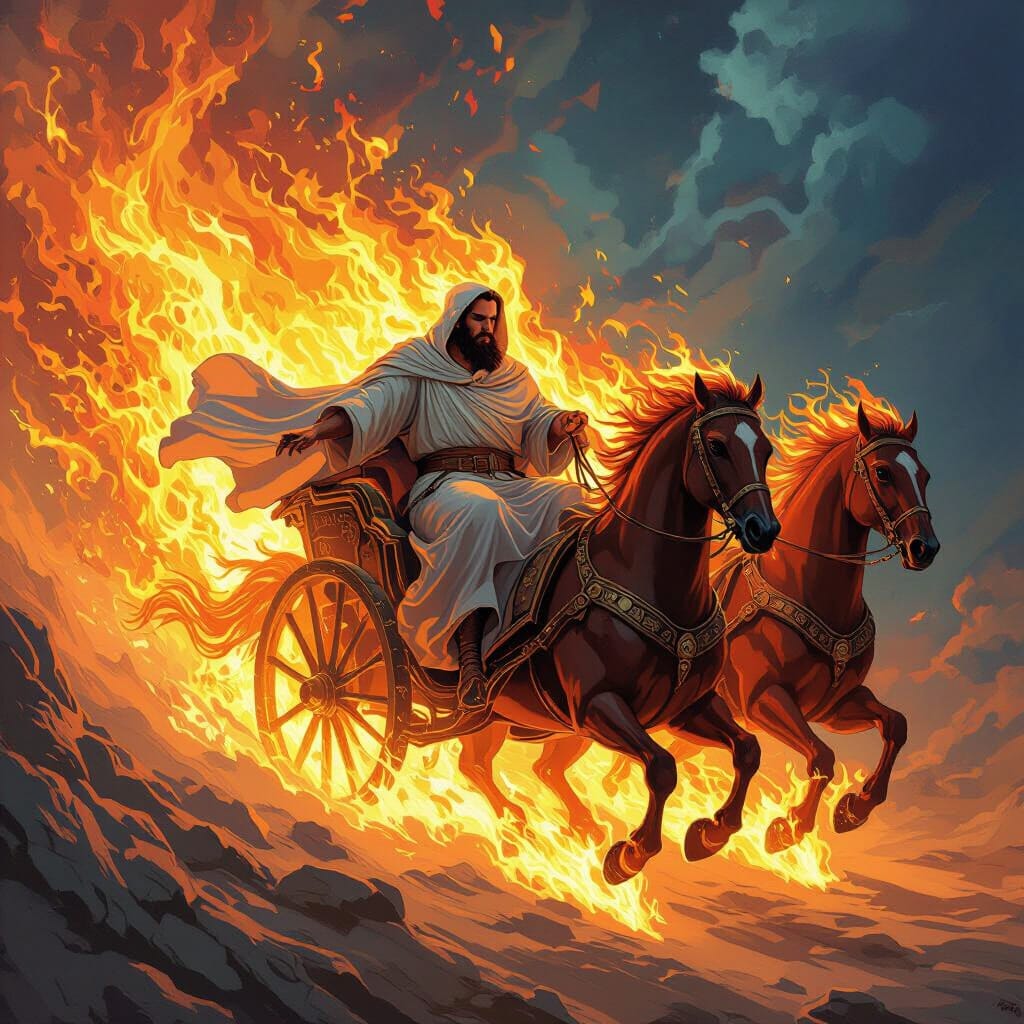
There, Elijah challenged the false prophets to a test to prove who the real God was. They would each sacrifice a bull and lay them on wooden alters with no fire. The prophets of Baal would call on their god and Elijah would call on the name of the Lord. The one who answered by fire from heaven would be the proven God.
The prophets of Baal went first, calling on Baal from morning to noon, but received no response. Elijah mocked them. They cut themselves with knives until evening with no response from their false god, Baal. Elijah then repaired the alter of the Lord, which had been previously torn down. He surrounded it with twelve stones (according to the twelve tribes of the sons of Jacob). He put the wood and slain bull on the alter and dug a large trench around the alter. He called for four barrels of water to be poured on the sacrifice and wood three times, and it was done three times. The water also filled the trench. Then Elijah called on the Lord to show the people that He is the God of Israel. Straightaway, fire fell from heaven and consumed the sacrifice, the wood, the stones, and all the water in the trench. And all the people saw it and fell on their faces and said, “The Lord, He is the God.” The false prophets were killed and Elijah proclaimed the drought to be over. Clouds formed and there was a great rain (1 Kings 18). Later in life, at the Lord’s direction, Elijah appointed a man named Elisha as the next prophet of Israel and mentored him. At the end of Elijah’s ministry, God took him to heaven in a chariot of fire with horses of fire by a whirlwind (1 Kings 19:19-21; 2 Kings 2:1-15).
Esther
During a period of exile from their land, the Jewish people were living under Persian rulership. Many were servants, but not enslaved. King Ahasuerus held a lavish feast at his palace, inviting his princes and servants, as well as nobles and princes from all the provinces. After many days of drinking, merriment and showing off his riches, he called for his queen to show off her beauty. But queen Vashti refused to come, the king was furious. To avoid any further insults and disrespect to other husbands of the region, he published a decree throughout his entire empire that he would replace her with someone more worthy of himself (Esther 1).
Officers were sent out to every province to gather all the pretty, young, unmarried women to the palace for the king to consider for his new bride. A beautiful, young Jewish lady named Esther, who was under the care of her older cousin, Mordecai, was among those brought to the palace. She quickly gained favor with Hegai, the supervisor of the women. However, Mordecai had advised her to not tell anyone she was a Jew. He was able to keep track of her during the year-long preparation period because he had an official position in the Persian court. When taken before the king, Esther (cont.)
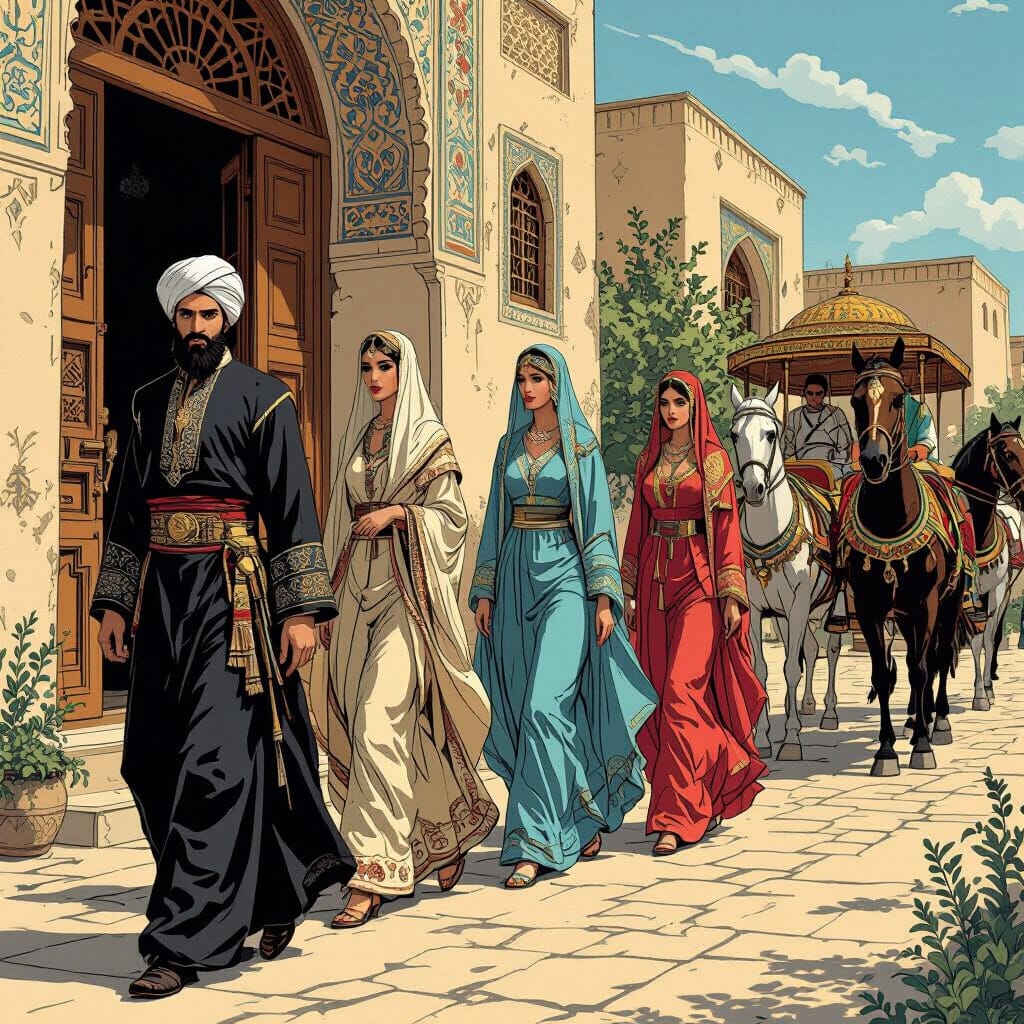
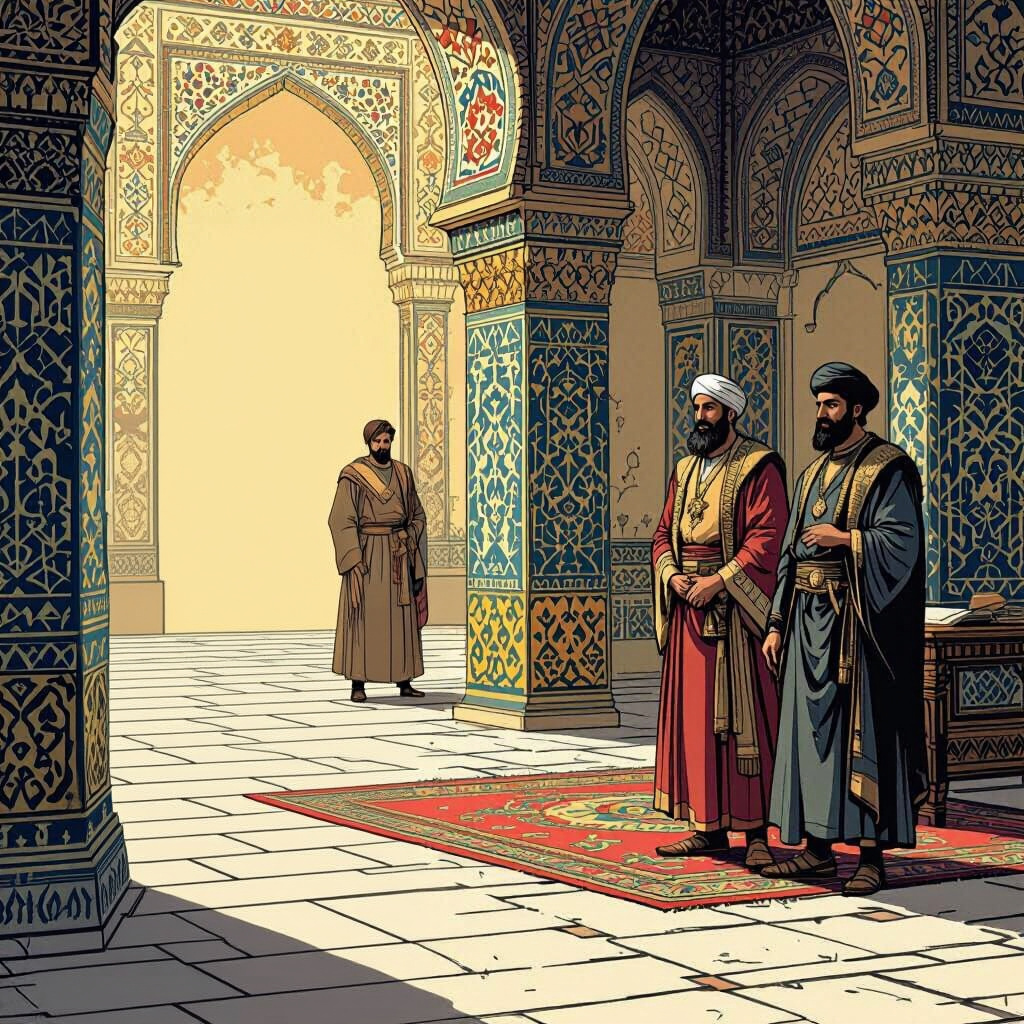
obtained grace and favor in his sight above all the women. He set the crown on her head and made her queen. In the course of his job, Mordecai overheard two of the king’s officers plotting to harm the king. Mordechai sent word to Esther and she notified the king what Mordechai had learned. The matter was investigated and the two officers were hanged (Esther 2).
Later, the king promoted an officer named Haman above all other princes. At the king’s order, all servants in the king’s gate were required to bow to him. But Mordecai refused to honor him because he was a Jew who bowed only to God. When the servants informed Haman of this, he was filled with wrath and determined to kill all Jews in the kingdom. He told the king that the Jews didn’t follow the king’s laws and should be destroyed. The king, still unaware that his wife was a Jew, agreed and gave Haman his ring to seal the edict. This meant that the decree can’t be cancelled for any reason. So the letter was sent to every leader of every province to kill every Jew on a certain day, and take their possessions (Esther 3).
Great weeping, fasting and prayer spread throughout the Jewish people upon this news. Mordecai put on sackcloth and ashes (cont.)
and cried out in anguish. Esther heard about the decree and sent an aide to get all the details from Mordecai. He relayed all the details and encouraged Esther to go to the king and plead for their people’s lives. However, in that time, the queen stayed separated from the king unless he called for her, and he hadn’t called for her in 30 days. And if anyone went before the king without being called, the punishment was death, unless he extends his golden scepter. When she passed the details of this challenge to Mordechai, he conveyed to her that she may have been placed in her position for such a time as this, to deliver her people. She sent word to Mordecai to have all their people in the area to fast for three days before she would go into the king, and if she perished, she perished (Esther 4).
On the third day, Esther put on her royal apparel and entered the throne room. When the king saw Esther, he held out his scepter and she approached him. He asked what her request was and said he would give her up to half of the kingdom. With wisdom given during the fasting period, she invited him, and Haman, the originator of the evil plot against the Jews, to a banquet she had prepared for him. They went without delay. There, the king again asked Esther (cont.)
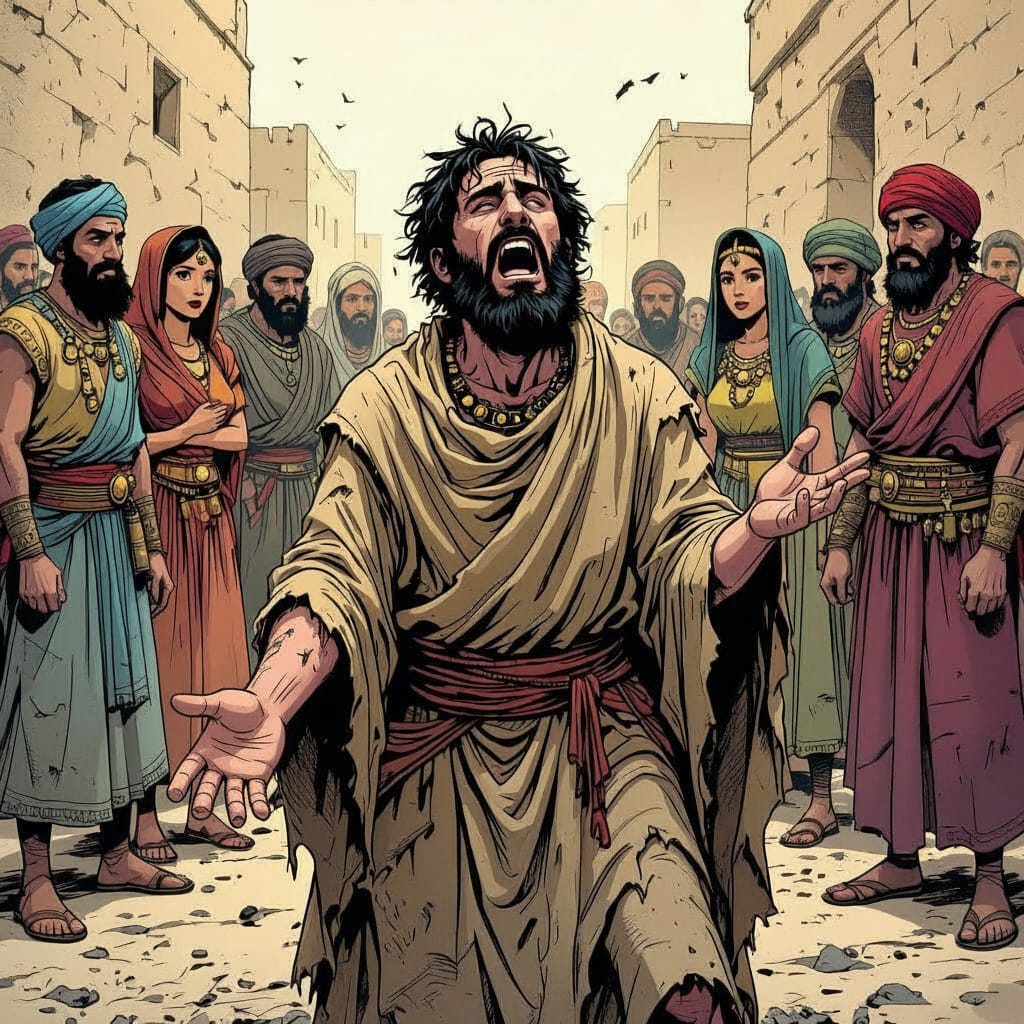
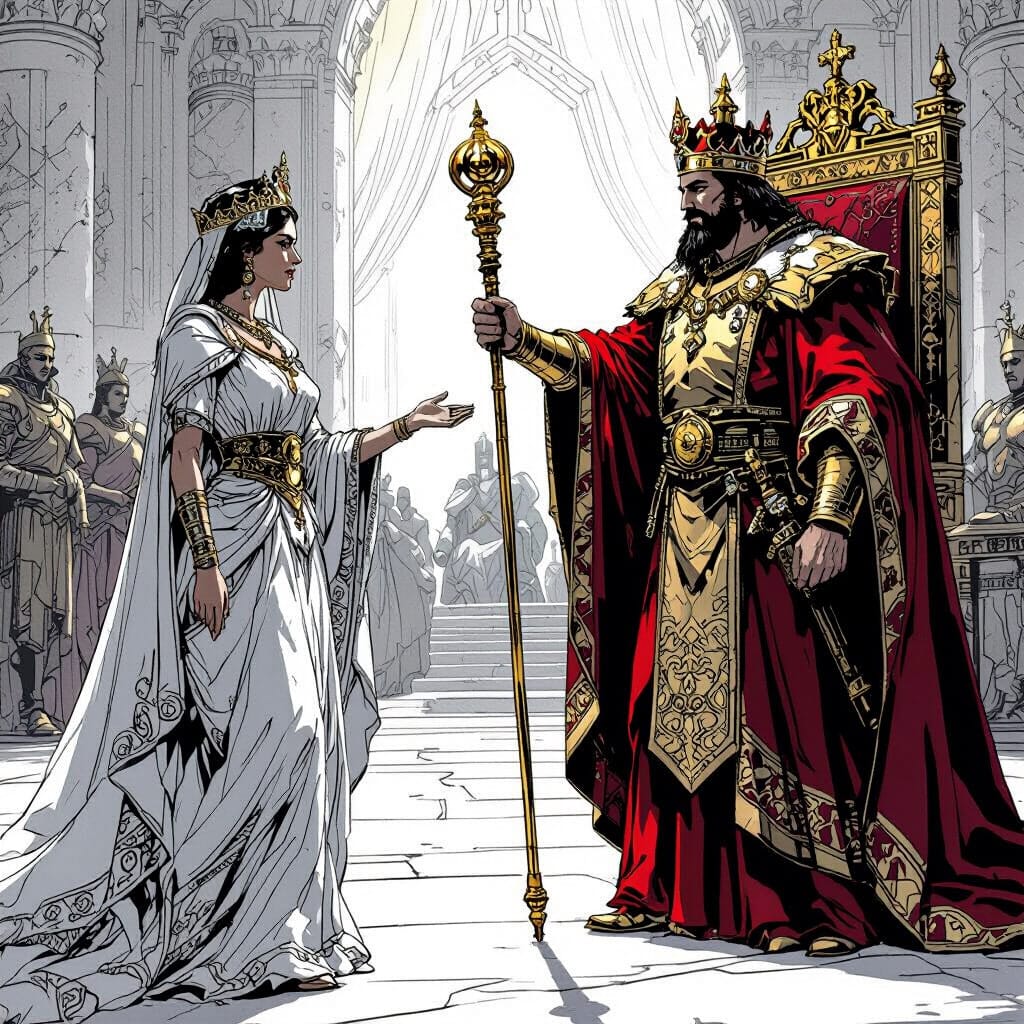
of her request. She again requested that he and Haman attend another banquet the next day, and she would then make known her request. Upon leaving the palace that day, Haman saw Mordecai at the king’s gate, and he again showed no reverence for him. Haman complained to his family and friends and they suggested building a gallows with which to hang Mordecai (Esther 5).
That night, the king couldn’t sleep (he was likely troubled by the Lord) and commanded his servants to read the book of records to him. He heard the account of when Mordecai relayed word of the plot against his life by the two hanged officers. The king asked what had been done to reward him for that, and his servants said nothing had been done. The king asked who was in the house and the servants told him Haman was there. Haman had come in early to ask the king to hang Mordecai on the gallows he had prepared. But when the king summoned him, he asked him what should be done to the man who the king wants to honor. Haman thought the king was talking about himself, so he said the man should be given royal apparel and the king’s horse, and a royal crown placed upon his head and be paraded through the city by one of the king’s most (cont.)
noble princes while proclaiming “This shall be done to the man whom the king delights to honor.” The king then instructed Haman to do all things he had just spoken for Mordecai the Jew–the man he wanted to hang! He did as the king commanded, then returned home and mourned in agony, telling his family and friends everything that had happened. They were struck with fear, believing Haman’s plans for the Jews would be his downfall. As they spoke, the king’s officers arrived at his house to take him to the banquet Esther had prepared (Esther 6).
So the king and Haman came to Esther’s banquet. The king again inquired of her request. She then replied, if she had found favor in his sight, that he save her life and those of her people from the coming slaughter. Now realizing Haman’s evil plan for the Jews would result in his wife’s death, he was furious and stormed to the palace garden to come up with a solution to the unalterable edict. Haman begged Esther for mercy and had fallen on her. appearing to attack her, as the king returned. Haman was seized and one of the officials informed the king that Haman had gallows built at his house to hang Mordecai. The king promptly hanged Haman on the (cont.)

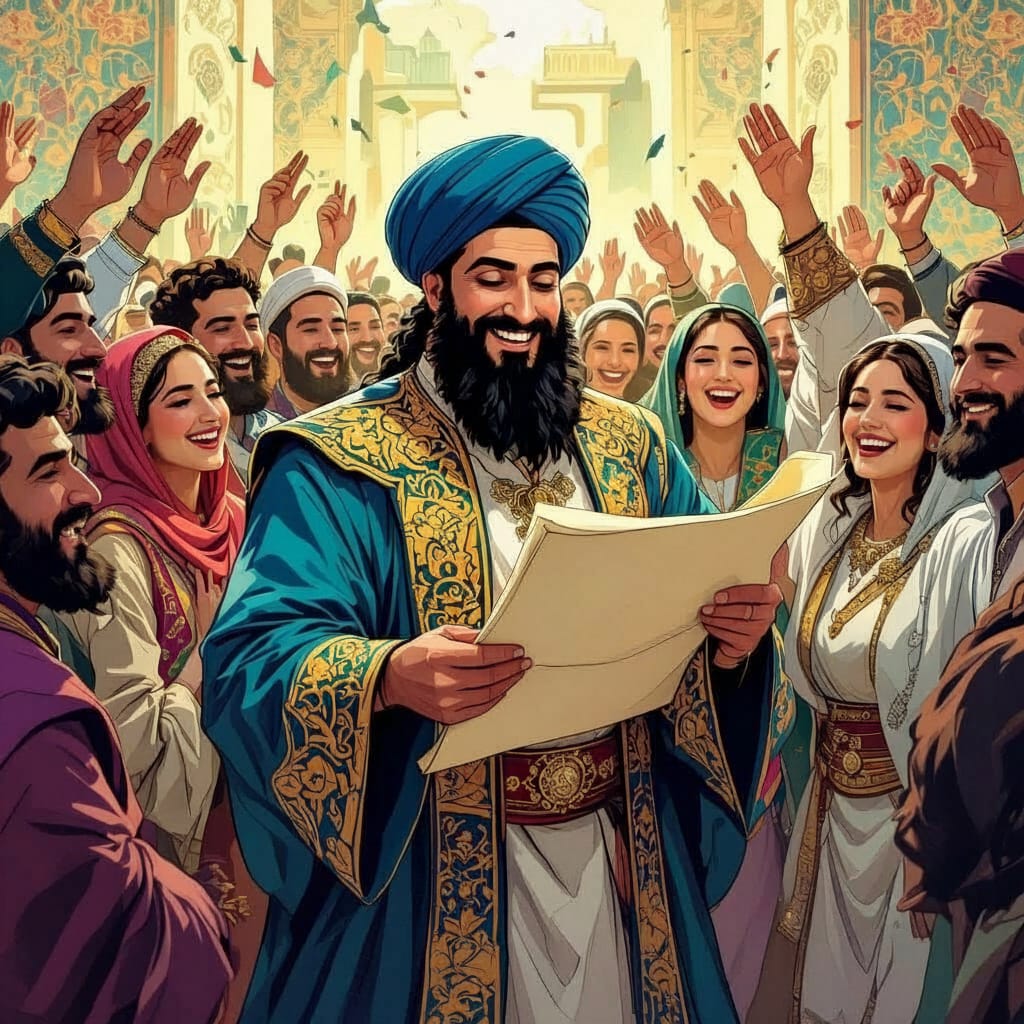
gallows he had prepared for Mordecai (Esther 7).
The same day, king Ahasuerus gave the house of Haman to Esther. He also gave Mordechai his ring, which he had given to Haman, and Esther set him over the house of Haman. Esther again came before the king and fell at his feet to plead for the edict to be annulled. He extended the scepter, but couldn’t reverse the edict. However, he allowed Esther and Mordecai to write a a new one in his name, with his seal, which allowed the Jews to gather and defend themselves from all attackers and keep the spoil of those they destroy. The new edict was sent to all the leaders of all 127 provinces. Joy and gladness came upon the Jews, and many people converted to Judaism as the reverence of the Jews came upon them (Esther 8).
As the day of the edict approached, fear had fallen on the enemies of the Jews. All the rulers of the provinces, lieutenants, deputies, and officers of the king helped the Jews, with reverence for Mordecai, as his name had become great in the king’s house, and his fame had spread throughout all the kingdom. On that day, the Jews slaughtered all that attacked them, which was over 75,000 men. The ten sons of Haman were hanged, as well. The Jews established an annual feast to remember the victory God had given them (Esther 9).
The lives of Esther and Mordecai are a clear example of the divine hand of God working to save the Jewish people from destruction. A sign of what Jesus, the Jewish Messiah, would do for all people spiritually in the future.
Daniel & Friends
There was a time when the city of Jerusalem and the land of Judah was taken into captivity by king Nebuchadnezzar and the kingdom of Babylon. The best of their young men, well favored, wise, and skillful in science, were taken into Babylon to be taught their ways and learn their language, so that, after three years, they would be able to serve in high positions and be worthy to stand before the king. Among them was Daniel, Hananiah, Mishael, and Azariah. They were given the Babylonian names of Belteshazzar, Shadrach, Meshach, and Abednego. God gave these four young men wisdom, knowledge and skill in all things. Daniel even received an understanding of visions and dreams. After the three-year preparation period, their supervisor brought them before king Nebuchadnezzar. He tested them in wisdom and understanding and found them to be ten times better than all his magicians and astrologers (Daniel 1).
During their second year as proven assets, the king had troubling dreams, yet forgot what was in them. He commanded all his magicians, astrologers and sorcerers to tell him the dream, and the interpretation of the dream, or be killed. They all said they couldn’t do it and the king gave the order to kill all the wise men in (cont.)
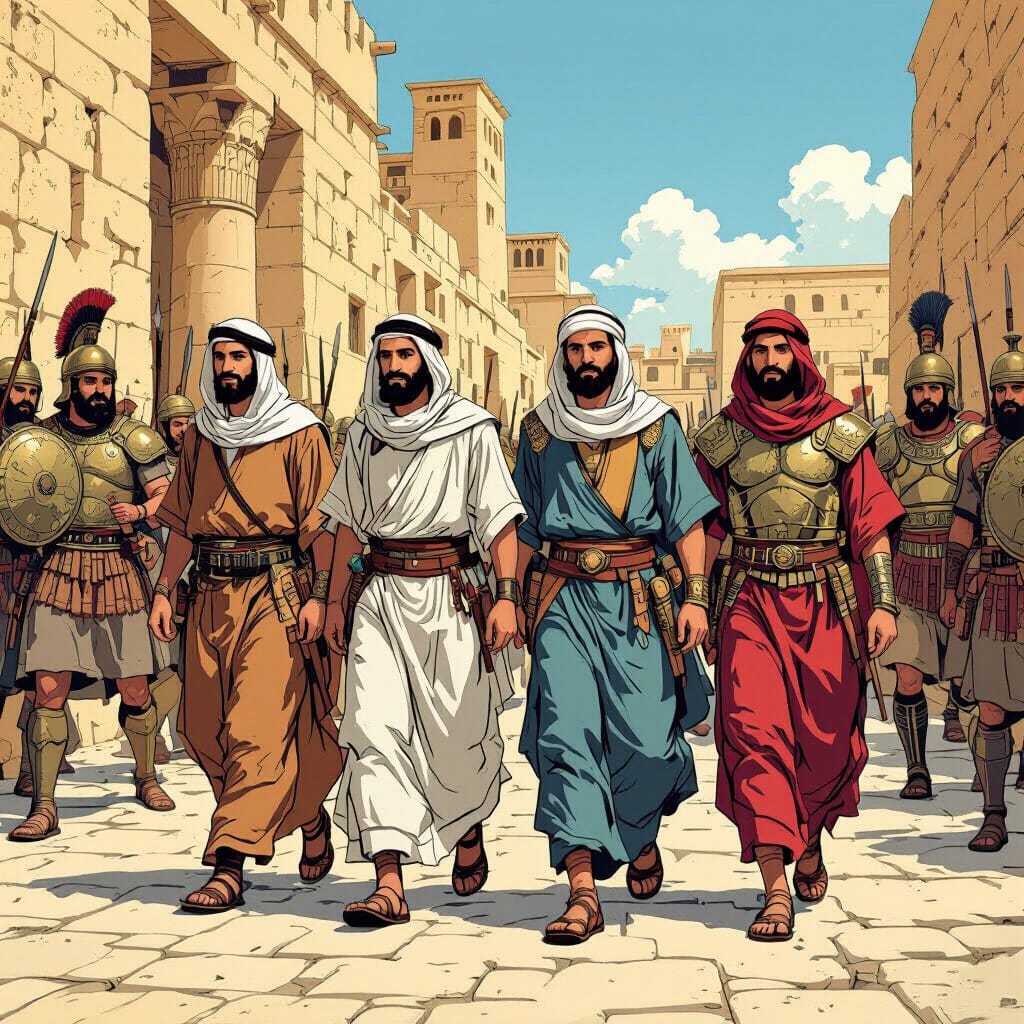
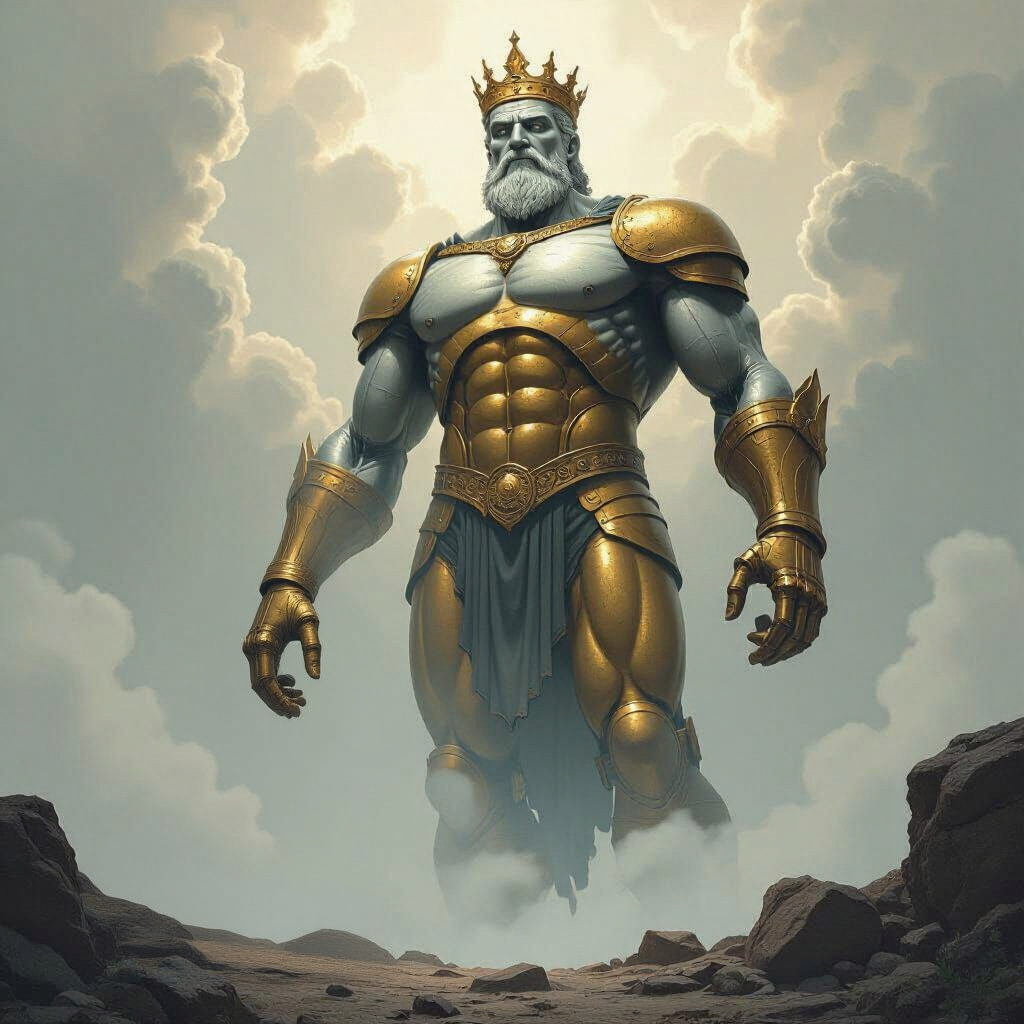
Babylon, which included Daniel and the three other Hebrews. Daniel persuaded the captain of the guard and the king that he could provide the answer, given some time. He went home and prayed earnestly with Hananiah, Mishael, and Azariah. Then, in a night vision, God revealed the secret to Daniel, and he praised Him for the revelation. Daniel was hastily brought before the king and he gave credit to God and described what God had shown him in the dream. He saw a giant statue with a head of gold, a chest and arms of silver, a belly and thighs of brass, legs of iron, and feet partly iron and partly clay. A stone hit the feet and broke them into pieces. Then the iron, brass, silver and gold was broken into pieces, became like dust, and was blown away in the wind. And the stone became a great mountain and filled the earth. Daniel then gave the king the interpretation of the dream. He said Nebuchadnezzar was a great king and God had given him a kingdom of power, strength and glory, and was the head of gold. And after him there will be a kingdom inferior to his (silver), then after that one of brass, then of iron which will break into pieces, then a kingdom divided, part iron and part clay, with mingled people who don’t mix, like iron and clay.
God will also set up a kingdom that will never be destroyed and will be the stone which breaks all the earthly kingdoms and stand forever. The king fell on his face and proclaimed that Daniel’s God is a God of gods, a Lord of kings, and a revealer of secrets. He made Daniel the ruler over all Babylon and chief of all governors and wise men of Babylon. Daniel appointed his three Hebrew friends directly under him (Daniel 2).
But Nebuchadnezzar had a short memory and later built a golden idol. He required everyone to bow down and worship it when certain music played. Anyone who did not bow down would be thrown in a fiery furnace. When Shadrach, Meshach and Abednego refused to worship the idol, they were accused and brought before the king by some Chaldean wise men. The king threatened to throw them into the fiery furnace and challenged them that their God could not deliver them out of his hand. The three Hebrews told the king that if he threw them into the fiery furnace, their God was able to deliver them from the furnace and would deliver them out of his hand. They followed up claiming that if he didn’t throw them in, they still wouldn’t serve his gods or worship the golden image. King (cont.)
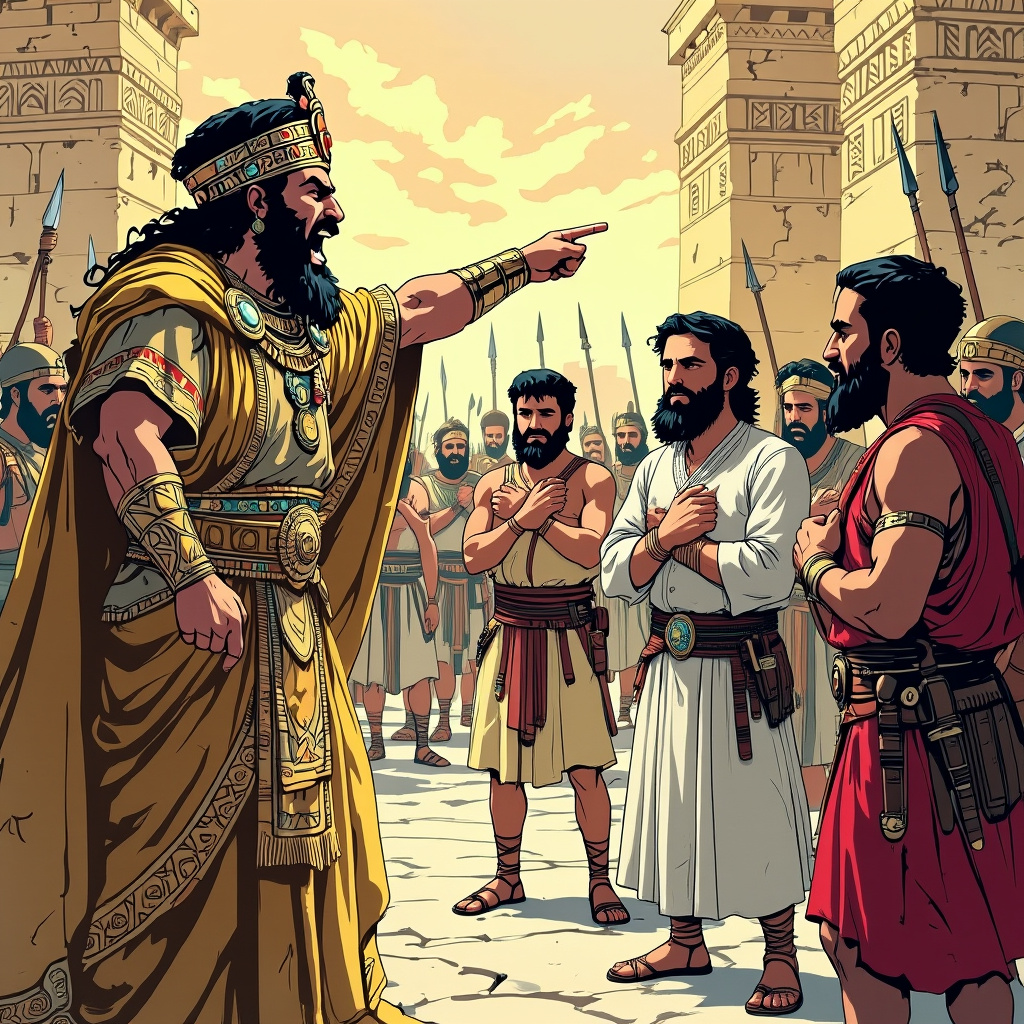
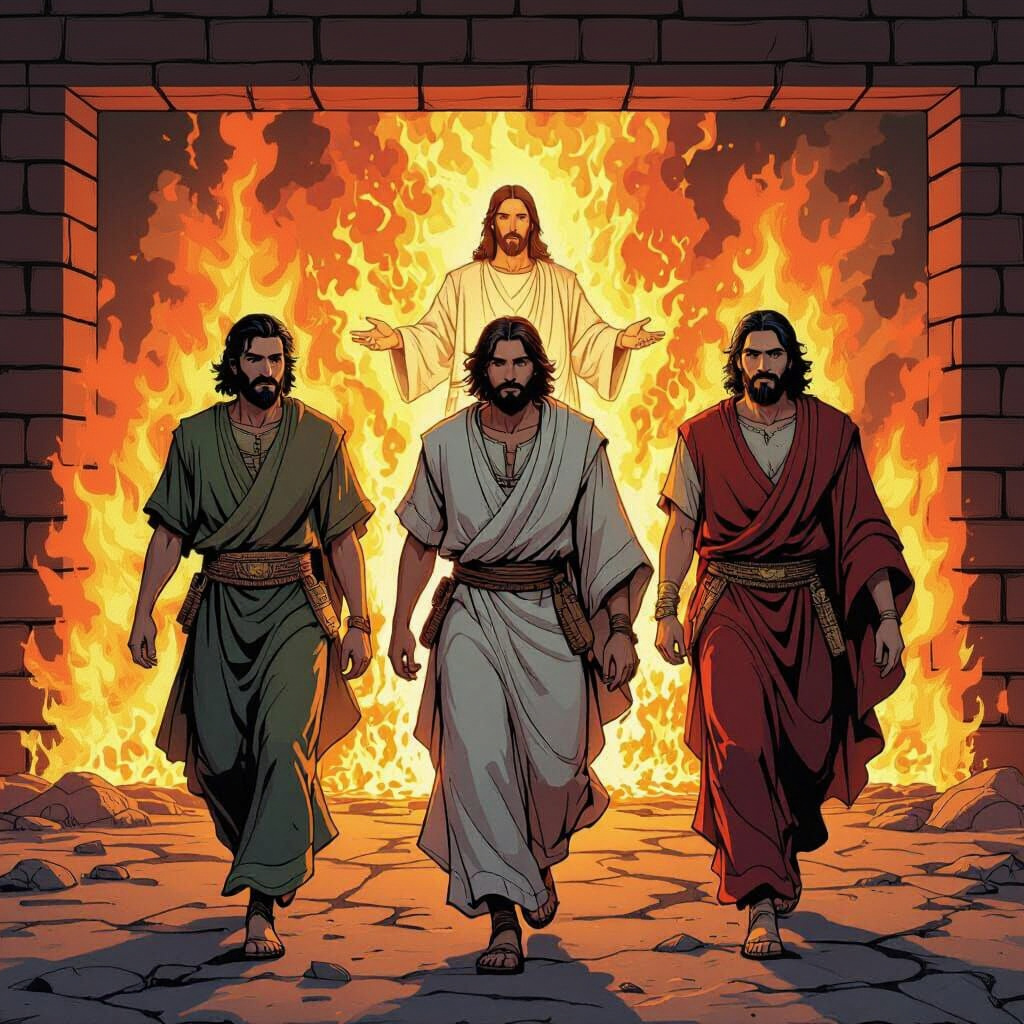
Nebuchadnezzar became furious and called for the furnace to be heated seven times hotter, and the Hebrews to be bound and cast into the furnace. The flames killed the men who threw them into the furnace, but the three Hebrews became loosed and moved about unharmed in the fire, along with a fourth person. The king was astonished and said the fourth man looked like the Son of God. The king called them out of the fire, addressing them as servants of the most high God. They came out with not a hair of their head singed, their clothes the same, and they didn’t even smell of smoke. Nebuchadnezzar blessed the God of the Hebrews who had sent His angel and delivered them for trusting in him so that they wouldn’t serve or worship any god except their own God. He made a decree that anyone who spoke anything against their God would be killed and their houses destroyed because there was no other God who could deliver this type of victory (Daniel 3).
However, over time, king Nebuchadnezzar remained in sin, and God gave him another dream to give him a chance to repent. It involved a tree as high as heaven with many good leaves and fruit. Everyone ate from it, animals found shade under it, and birds nested in it.
A holy one came down from heaven and said to cut down the tree, cut off its branches, shake off the leaves, scatter the fruit and drive away the animals and birds. But leave the stump in the grass and let it be wet with dew and stay with the beasts of the field. And let its heart be changed from man’s to beast’s for seven times passing over him. The king’s wise men couldn’t interpret it, so Daniel hesitantly gave the grave interpretation. The large strong tree providing for all was Nebuchadnezzar. He would be cut down by God, but not totally destroyed. He would be driven away from men and would live with the animals of the field and eat grass for seven years until he realizes that God rules the kingdom of men and decides who to give it to. Only then would he be restored. Daniel encouraged the king to listen to the interpretation and break off his sins and show mercy to the poor to keep this from happening. A year later, the king still hadn’t repented. He proudly claimed he had bouilt the great kingdom of Babylon by his power. While he spoke, God spoke and took his understanding. He was driven out and ate grass like an ox for seven years. Then God brought him back into his right mind and he praised the one true God and was restored to his kingdom (Daniel 4).
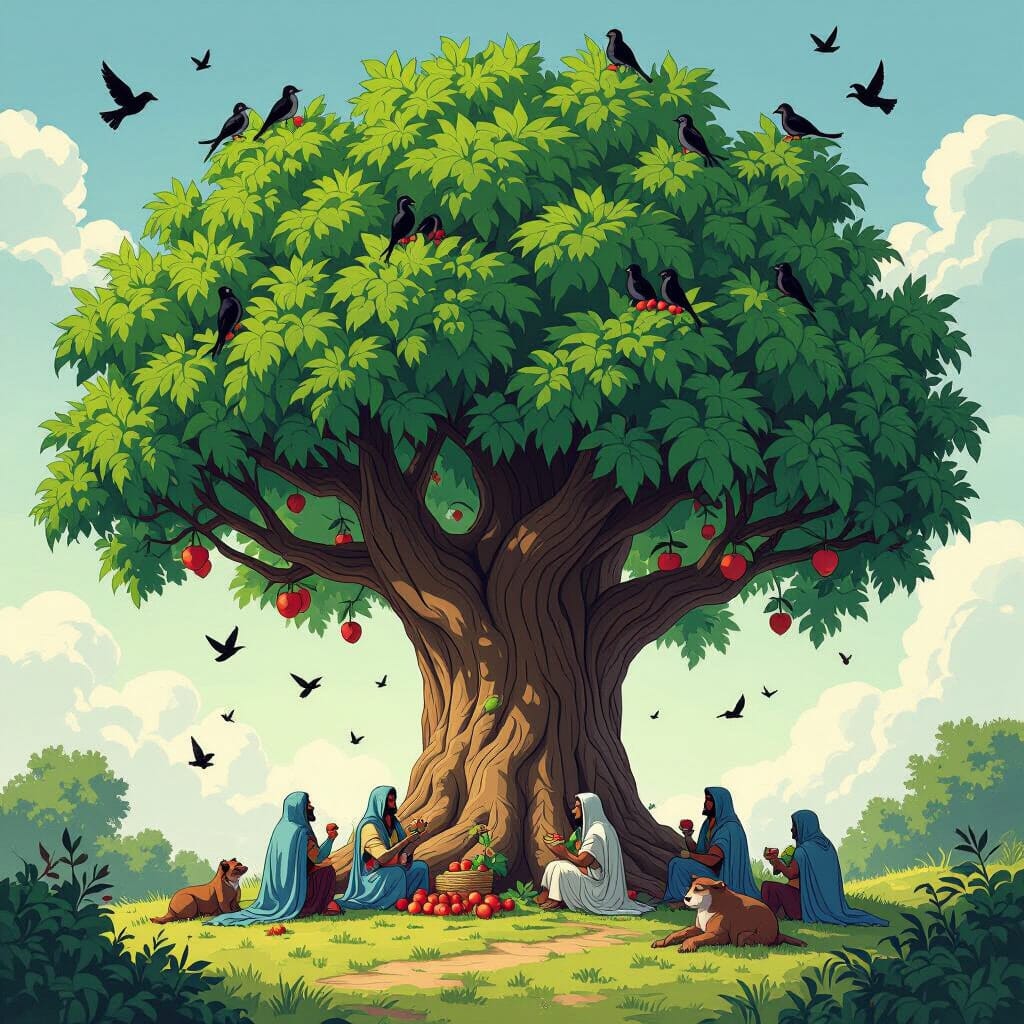
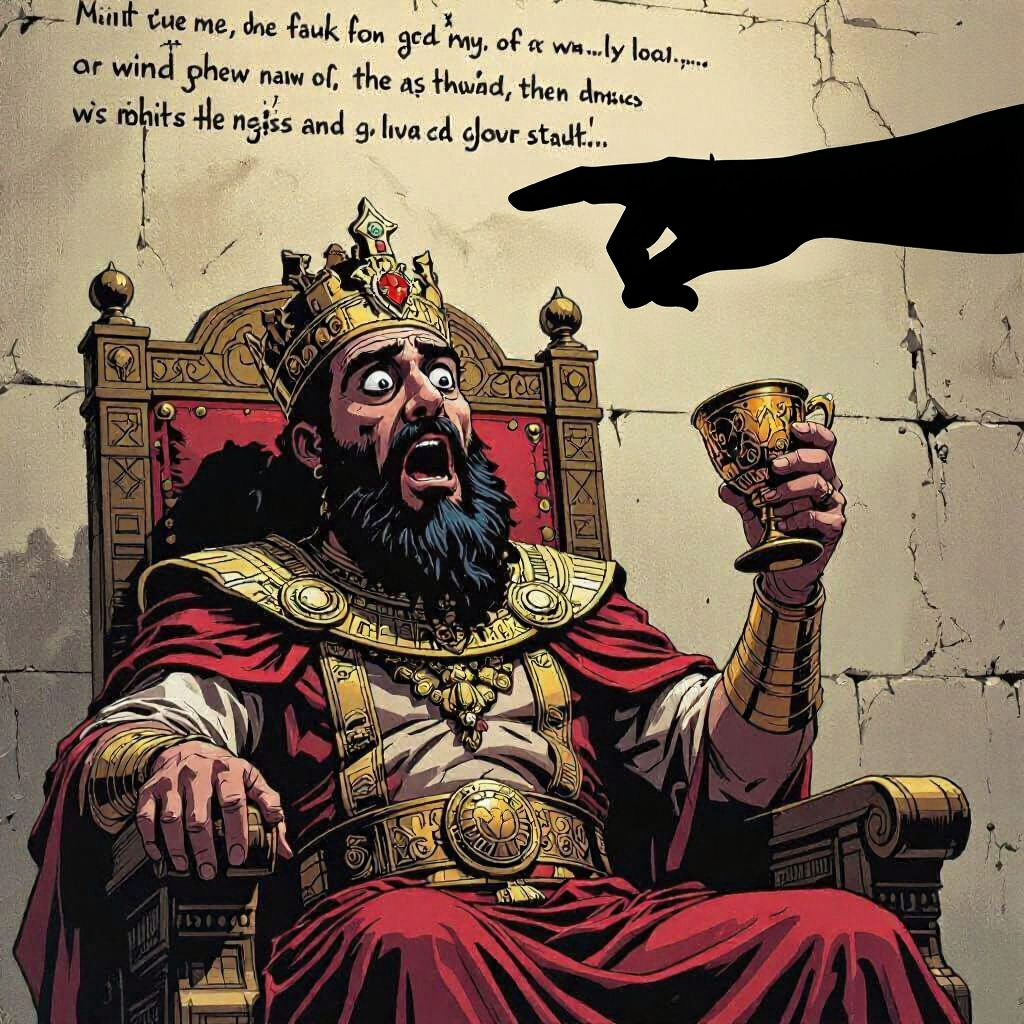
When Nebuchadnezzar’s son, Belshazzar, succeeded him as king, he followed in his father’s former ways of evil. During a feast with 1,000 of his officers, he called for the gold and silver vessels his father had stolen from the Jewish temple in Jerusalem. They drank wine from them as they praised the gods of gold, silver, brass, iron, wood and stone. That same hour, a man’s fingers appeared and wrote a message on the wall of the palace. Belshazzar was terrified and and called for the astrologers, wise men and soothsayers. He promised rewards of riches and leadership in the kingdom for whoever could read the writing and show him the interpretation of the message. The wise men could neither read nor interpret the writing. His wife, the queen, heard the stir and came into the banquet. She informed him that a man of God in his kingdom could interpret the message. She expounded on his interpreting dreams of his father and how he made master of all the other wise men. The king brought Daniel in and admitted he knew of him, and what he had done for his father. Then Daniel stated that the king’s father, Nebuchadnezzar, had gone through those things due to his sin and pride, and also that Belshazzar was now doing the same things even though he (cont.)
knew of his father’s trials. And how he used the holy vessels from God’s temple to drink wine from, and praised false gods, instead of glorifying the true God. Then he read the writing and interpreted it. It read, “God has numbered your kingdom and finished it. You are weighed in the balances and are found wanting. Your kingdom is divided and given to the Medes and Persians.” That night, king Belshazzar was slain and Darius the Median took the kingdom (Daniel 5).
Darius set 120 princes over the kingdom, and three leaders over them. One of the three leaders was Daniel, who became the king’s favorite. He was even considering placing him over the whole kingdom. This made the other leaders jealous and they tried to find fault with Daniel, but couldn’t. But they realized his uncompromising worship to his God could provide an opportunity to harm him. They gathered before the king and stoked his ego. They talked him into making a statue of himself and signing a decree that whoever prays to any other God or man besides him for 30 days would be thrown into the den of lions. Knowing this, Daniel still went into his house by an open window toward Jerusalem, kneeled, prayed, and (cont.)
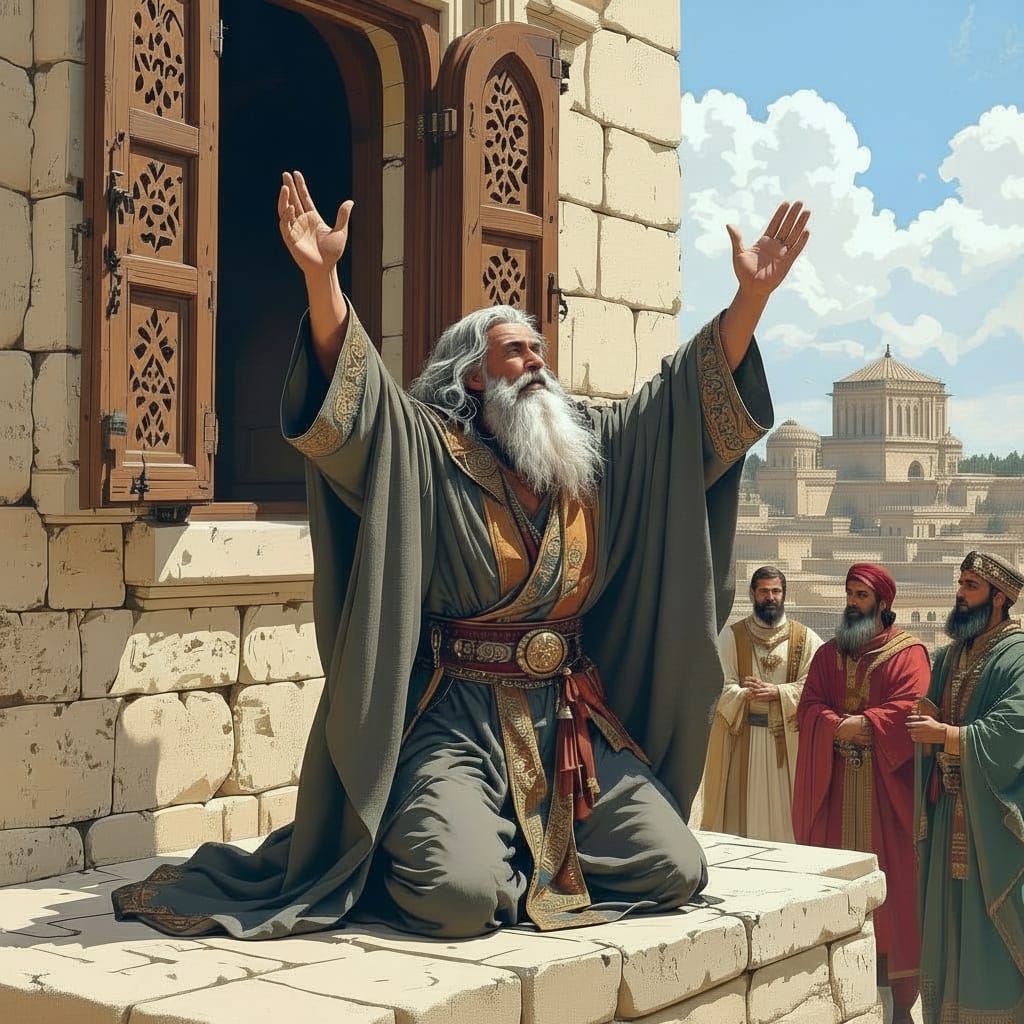
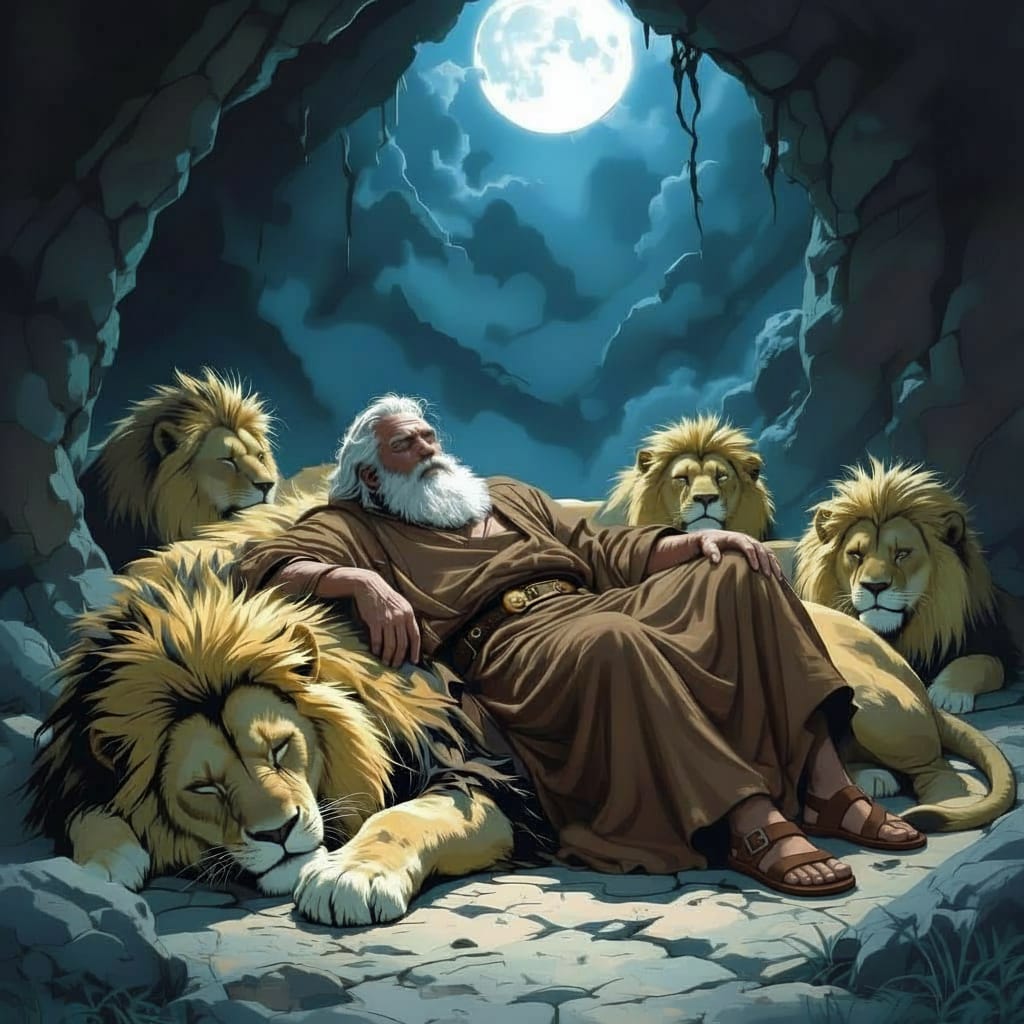
gave thanks to God, as was his custom three times a day. The other leaders lay in wait and saw him praying to God and went and told king Darius. The king was very regretful with himself because he liked Daniel above all his leaders. He labored until sundown to find a way to prevent his death, due to the law that didn’t allow any decree of the king to be changed. He was forced to have Daniel thrown into the lion’s den, but left him with a prayer that his God, whom he serves continually, will deliver him. The king stayed up all night fasting, refusing music, and unable to sleep. The next morning, the king rose very early and hastily went to the den and cried out. “Oh Daniel, servant of the living God, is your God, whom you serve continually, able to deliver you from the lions?” Daniel replied, “Oh king, live forever,” and said God sent his angel to shut the mouths of the lions and he was unharmed. The king was overjoyed and called for Daniel to be lifted out of the den. The king then commanded Daniel’s accusers and their families to be thrown into the lion’s den and the lions devoured them as soon as they hit the ground. King Darius then wrote a decree to all in his kingdom that everyone should fear the God of Daniel, the living God whose kingdom (cont.)
will last forever, who works signs and wonders in heaven and earth, and who delivered Daniel from the power of lions (Daniel 6).
Daniel went on to have prophetic night visions in which the Son of man came in the clouds of heaven and was given to Him dominion, and glory, and a kingdom that all people, nations, and languages would serve Him in everlasting dominion which would never pass away and His kingdom that shall not be destroyed, despite the attempts of evil men to do so (Daniel 7).
Daniel had other prophetic visions from the Lord, as well. Many of these are quoted by Jesus’ disciples in the New Testament. The Old & New Testament page of this website features many of these prophecies and their fulfillment, clearly proving that Jesus is the Jewish Messiah and Savior of the world.
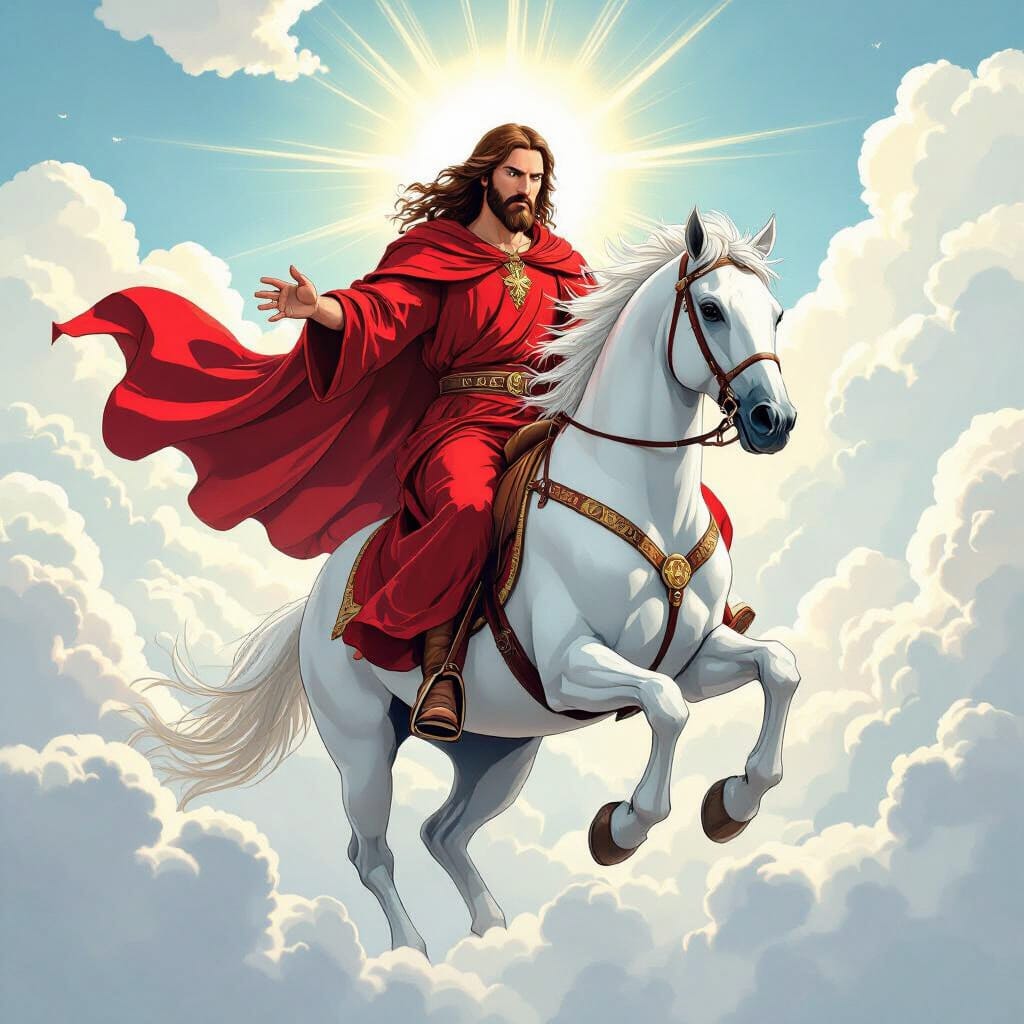
Jonah

God spoke to Jonah, a prophet, to go to a big city called Nineveh to preach against their wickedness. But Jonah didn’t want to do it. He chose to run away from God, and boarded a ship in Joppa which was going to Tarshish, via the Mediterranean Sea. This was 2,500 miles in the opposite direction! So, God brought a strong wind storm into the sea which nearly broke the boat apart. All the mariners were afraid and prayed to their false gods and dumped cargo overboard to lighten the ship. Meanwhile, Jonah was below deck, fast asleep. The captain came and woke him up to get him to pray to his God to rescue them. They then cast lots to see who had brought the storm upon them, and the lot fell to Jonah. The mariners asked him who he was and what evil he had done to bring this upon them. Jonah said he was a Hebrew who feared the God of Heaven, who made the sea and the land. He had previously told some of them that he had fled from God, so they asked him what they should do with him so that the storm would calm. He told them to throw him into the sea. After failing to make it to shore, they asked God for mercy and threw Jonah overboard. Right away, the sea calmed, and all the mariners feared the God of Jonah and made a sacrifice and vows to Him. God
had already prepared a giant fish to swallow Jonah. It did, and Jonah was in the belly of the fish three days and three nights (Jonah 1).
Jonah prayed a prayer of repentance to God in the fish’s belly, and God directed the fish to spit Jonah out on dry land (Jonah 2).
God repeated His command to Jonah to go to Nineveh and preach repentance to the people. He travelled there and went into the city with the warning that in 40 days, Nineveh will be overthrown if they didn’t repent of their evil behavior. The people believed God’s message, declared a fast, and everyone put on sackcloth, including the king. He issued a decree throughout Nineveh that no man or animal eat or drink and for all to turn from evil. Then God saw their actions, and determined to spare the city (Jonah 3).
God’s mercy greatly angered Jonah to the point he asked God to take his life. He went out of the city to watch what might happen to the city. God made a gourd to grow over him to provide shade, and Jonah’s grief was eased. God then brought a worm to kill the gourd and Jonah again wanted to die in the heat of the sun. God showed Jonah he had pity on the gourd even though he hadn’t grown it, so how much more should He care about the over 60,000 people that were spared (Jonah 4).
In Matthew 12:40, Jesus quotes Jonah 1:17 regarding Jonah being in the belly of the fish three days and three nights, as a foreshadowing of His being three days and nights in the heart of the earth from His crucifixion to His resurrection.
Jesus also said, as Jonah was a sign to the Ninevites, He would be a sign to His generation (Luke 11:29-32).
